#Generation gaps in China
Explore tagged Tumblr posts
Text
as i’m sure many of you know, “fertility” rates are my, uh, one too many drinks cause, bc the following things (inter alia) piss me off:
calling it fertility rate
saying women aren’t having kids bc lack of good parental leave and health policies in the U.S.
saying women aren’t having kids bc scary future and bad present
saying women want more kids but aren’t bc, see above
here’s some fun graphs and excerpts from an article in the economist that i know i’ve posted before but you can never see them too often


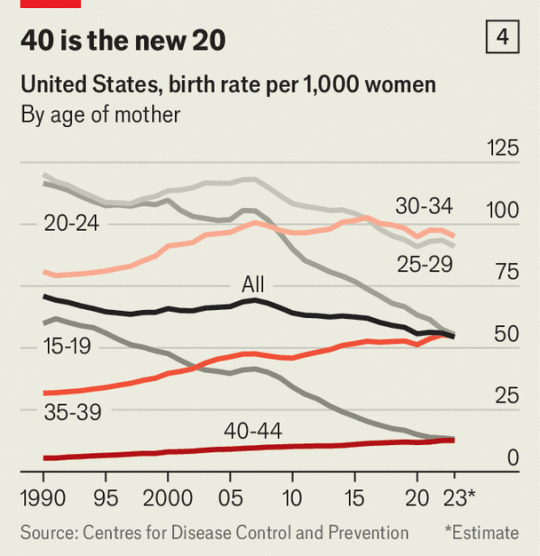
govts have tried just giving new parents straight cash: “The thinking behind [financial incentive policies of giving new parents straight cash] dates back to the entrance of women into the workforce en masse, which happened at around the same time as birth rates started their long decline. “ but these policies “have a relatively small impact [and are] fabulously expensive, as lots of cash goes to parents who would have had children regardless of the financial incentives available. Each child that resulted from Family 500+, in the years from the Polish financial-bonus scheme’s introduction in 2016 to 2019, cost $1m. In France each extra child over the past decade has cost twice that.” so…it ain’t money
male economists remain incapable of understanding parenthood: “Gary Becker, a Nobel-prizewinning economist, suggested in the 1960s that the best way to consider children is as goods that parents purchase according to how many they can afford, both in terms of time and money. Easing the burden of a career and expanding household budgets should therefore boost childbearing, he concluded.” 😒
drop of fertility is bc we functionally fixed teenage pregnancy (for now): “More than half the drop in America’s total fertility rate is explained by women under the age of 19 now having next to no children. Around a third of the missing births would have been unplanned, and the majority of them would have been to women on low incomes. . . . “Similarly, in Britain women born in 2000 had half as many children before they were 20 as those born in 1990. Unlike their rich counterparts, these women will probably not compensate by having more children later in life.”
maybe women just don’t want kids!: “Meanwhile, there is little evidence that middle-class women wish they had many more children, which would at least suggest they might be open to official persuasion. Today, at the age of 24, college-educated American women want on average 2.2 children—roughly as many as previous generations. They will now have these children a little later than before, with the first arriving at the age of 30, compared with 28 in 2000. Although trends suggest that they will fall short of their ideal family size, the gap may be the same as for women in previous generations, who missed the target by an average of 0.25 children.”
“[S]ome programmes are now beginning to explicitly target [low income and/or younger women]. Zhejiang, a province on China’s eastern border, is offering newly married couples a lump sum, but only if the bride is below the age of 25. In Russia women who have a child before they turn 25 will soon be exempt from income tax. Hungary offers a similar benefit to mothers who have their first child before 30—one of only two policies in Viktor Orban’s pro-natal push that economists at the Central European University think has created additional births. Although small families are becoming more common almost everywhere, women who start young still tend to have more children over their lifetime, which is why Messrs Orban, Putin and Xi are focusing on them.” nightmare blunt rotation
“young mothers laugh when asked if $7,500 would be enough of an incentive to encourage them to have another child; after all, low-income American households typically spend $20,000 in a baby’s first year of life. But such money may well have an impact at the margin. As one mother puts it, extra cash “might make me keep one I wasn’t sure I was going to have”. In America poor women are much more likely than middle-class women to cite financial hardship as a reason for an abortion.” cool society we live in
can we please built a society that doesn’t depend on women having children they don’t want: “extra children produced by targeted policies will probably not turn into the productivity-boosting professionals that governments most desire. Only 8% of the children of American-born non-college-educated parents are themselves expected to obtain a bachelor’s degree, and during his or her adult life the average high-school graduate boosts the public finances by less than a tenth of the net contribution of a college graduate. Therefore the financial benefits of pro-natal policies aimed at working-class women would probably be overwhelmed by their costs, given the expense associated with even well-targeted programmes.”
see also: “A first-time American mother in her mid-30s will earn more than twice what she would have earned had she had her first child aged 22. Women who give birth aged 15 to 19 are more likely to develop health problems; their first child is more likely to drop out of high school and to grow up without having both parents at home. In Flint many mothers express regret that they did not manage to “get things sorted” before they started to have children. “Hang on,” says one outside a community centre. “The idea is that I get paid just enough to make me have another kid? But that’s all that changes? Where doing it [raising a kid] right, later on, it’s all me? That doesn’t seem right.” The 26-year-old mother of three leans back, and laughs.”
anyway

2K notes
·
View notes
Note
Tim discovers that Dani's upbringing by Vlad has left some gaps in her knowledge. Weird gaps. (What zebras are, where China is, cannibalism is bad, etc) Not out of malice, or anything. It just didn't occur to Vlad to teach her that stuff.
“Okay. So what’s this?”
Dani stared at the phone, which was showing her a picture of Princess Diana.
“… uh. A pretty woman?”
Tim wrote that down on a clipboard. Dani looked at him nervously, but thankfully, Cassie quickly stepped in.
Cassie said, “No, that’s Princess Diana of Wales. In that picture, she’s attending a party and wearing what’s been dubbed ‘Diana’s revenge dress’ after she found out that her husband cheated on her.”
Dani perked up. “Ooh, hell yeah! Good for her!”
They moved on quickly, hoping that Dani wouldn’t ask any more questions. Bart found another picture and showed it to her.
“Okay, what’s this?”
“…. An alien life form.”
Tim snorted. “That’s a bobbit worm.”
Kon took the phone and then showed it to her. “Okay, what’s this!”
Dani stared at the picture of a gun and said, “That’s a gray 3rd generation Glock 19 with two 10-round magazines.”
Everyone stared at her blankly. Then they looked at Tim, who was already writing it down hurriedly.
Dani frowned, as Bart took back the phone and then said, “Okay, what’s this?”
“…. Another alien life form?”
Very dryly, Kon said, “That’s a chamoy pickle.”
Excitedly, Bart said, “Ooh! We should make you some! They’re really good!”
Dani beamed. “I can’t wait to try it! Da— Vlad never taught me stuff like this!”
“No, only about murder and weapons and how cannibalism isn’t too bad,” Tim muttered under his breath, still writing stuff.
Cassie sighed and patted Dani’s head. “Oh, you sweet summer child, we have so much to teach you. I’m gonna have to call Cissie if this goes on…”
#dpxdc#dcxdp#dp x dc#dc x dp#danny phantom x dc#dp x dc crossover#ask#anon ask#dani fenton#dani phantom#cassie sandsmark#vlad plasmius#kon kent#kon el#tim drake#bart allen#ty for the ask!#danielle fenton#danielle phantom
955 notes
·
View notes
Text
Writing a "Curious" Character

Curiosity - the impulse or desire to investigate, observe, or gather information, particularly when the material is novel or interesting.
This drive appears spontaneously in nonhuman animals and in young children, who use sensory exploration and motor manipulation to inspect, bite, handle, taste, or smell practically everything in the immediate environment.
The Five-Dimensional Model of Curiosity
Deprivation sensitivity—recognizing a gap in knowledge the filling of which offers relief. This type of curiosity doesn’t necessarily feel good, but people who experience it work relentlessly to solve problems. This dimension was derived from Berlyne and Loewenstein’s work.
Joyous exploration—being consumed with wonder about the fascinating features of the world. This is a pleasurable state; people in it seem to possess a joie de vivre. This dimension was influenced by Deci’s research.
Social curiosity—talking, listening, and observing others to learn what they are thinking and doing. Human beings are inherently social animals, and the most effective and efficient way to determine whether someone is friend or foe is to gain information. Some may even snoop, eavesdrop, or gossip to do so. This dimension stems from Renner’s research.
Stress tolerance—a willingness to accept and even harness the anxiety associated with novelty. People lacking this ability see information gaps, experience wonder, and are interested in others but are unlikely to step forward and explore. This dimension builds on recent work by Paul Silvia, a psychologist at the University of North Carolina at Greensboro.
Thrill seeking—being willing to take physical, social, and financial risks to acquire varied, complex, and intense experiences. For people with this capacity, the anxiety of confronting novelty is something to be amplified, not reduced. This dimension was inspired by Zuckerman's work.
The researchers conducted surveys across the United States to discover which of the dimensions lead to the best outcomes and generate particular benefits.
For instance, joyous exploration has the strongest link with the experience of intense positive emotions.
Stress tolerance has the strongest link with satisfying the need to feel competent, autonomous, and that one belongs.
Social curiosity has the strongest link with being a kind, generous, modest person.
They also explored attitudes toward and expressions of work-related curiosity.
In a survey of 3,000 workers in China, Germany, and the United States, they found that 84% believe that curiosity catalyzes new ideas, 74% think it inspires unique, valuable talents, and 63% think it helps one get promoted.
In other studies across diverse units and geographies, they have found evidence that 4 of the dimensions—joyous exploration, deprivation sensitivity, stress tolerance, and social curiosity—improve work outcomes.
The latter two seem to be particularly important: Without the ability to tolerate stress, employees are less likely to seek challenges and resources and to voice dissent and are more likely to feel enervated and to disengage.
And socially curious employees are better than others at resolving conflicts with colleagues, more likely to receive social support, and more effective at building connections, trust, and commitment on their teams.
People or groups high in both dimensions are more innovative and creative.
A monolithic view of curiosity is insufficient to understand how that quality drives success and fulfillment in work and life. To discover and leverage talent and to form groups that are greater than the sum of their parts, a more nuanced approach is needed.
Psychologists have compiled a large body of research on the many benefits of curiosity:
It enhances intelligence: In one study, highly curious children aged three to 11 improved their intelligence test scores by 12 points more than their least-curious counterparts did.
It increases perseverance, or grit: Merely describing a day when you felt curious has been shown to boost mental and physical energy by 20% more than recounting a time of profound happiness.
And curiosity propels us toward deeper engagement, superior performance, and more-meaningful goals: Psychology students who felt more curious than others during their first class enjoyed lectures more, got higher final grades, and subsequently enrolled in more courses in the discipline.
Since the 1950s psychologists have offered competing theories about what makes one person more curious than another. Rather than regard curiosity as a single trait, we can now break it down into five distinct dimensions. Instead of asking, “How curious are you?” we can ask, “How are you curious?”
Sources: 1 2 ⚜ More: Writing Notes & References ⚜ Writing Resources PDFs
#curiosity#psychology#writing notes#writeblr#character development#literature#writers on tumblr#writing reference#dark academia#spilled ink#writing prompt#creative writing#character building#light academia#writing inspiration#writing ideas#eugene de blaas#writing resources
383 notes
·
View notes
Text
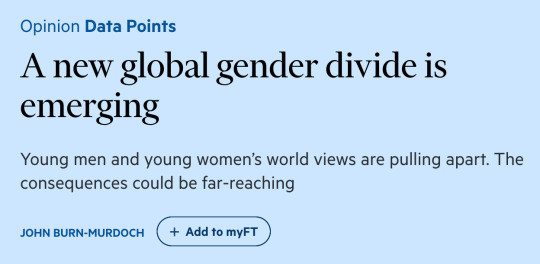
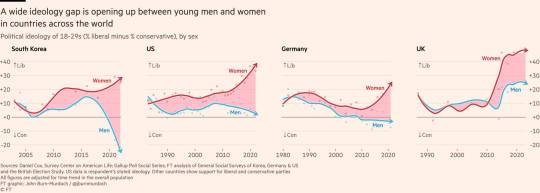
A new global gender divide is emerging (John Burn-Murdoch, Financial Times, Jan 26 2024)
"In the US, Gallup data shows that after decades where the sexes were each spread roughly equally across liberal and conservative world views, women aged 18 to 30 are now 30 percentage points more liberal than their male contemporaries.
That gap took just six years to open up.
Germany also now shows a 30-point gap between increasingly conservative young men and progressive female contemporaries, and in the UK the gap is 25 points.
In Poland last year, almost half of men aged 18-21 backed the hard-right Confederation party, compared to just a sixth of young women of the same age.
Outside the west, there are even more stark divisions.
In South Korea there is now a yawning chasm between young men and women, and it’s a similar situation in China.
In Africa, Tunisia shows the same pattern.
Notably, in every country this dramatic split is either exclusive to the younger generation or far more pronounced there than among men and women in their thirties and upwards.
The #MeToo movement was the key trigger, giving rise to fiercely feminist values among young women who felt empowered to speak out against long-running injustices.
That spark found especially dry tinder in South Korea, where gender inequality remains stark, and outright misogyny is common.
In the country’s 2022 presidential election, while older men and women voted in lockstep, young men swung heavily behind the right-wing People Power party, and young women backed the liberal Democratic party in almost equal and opposite numbers.
Korea’s is an extreme situation, but it serves as a warning to other countries of what can happen when young men and women part ways.
Its society is riven in two. Its marriage rate has plummeted, and birth rate has fallen precipitously, dropping to 0.78 births per woman in 2022, the lowest of any country in the world. (…)
It would be easy to say this is all a phase that will pass, but the ideology gaps are only growing, and data shows that people’s formative political experiences are hard to shake off.
All of this is exacerbated by the fact that the proliferation of smartphones and social media mean that young men and women now increasingly inhabit separate spaces and experience separate cultures.
Too often young people’s views are overlooked owing to their low rates of political participation, but this shift could leave ripples for generations to come, impacting far more than vote counts."
804 notes
·
View notes
Text
A Duke's Silence


Co-author: @astarry-moon
Synopsis: They called him cold. Distant. Impossibly composed. The kind of man you should never try to love because he would never love you back.
You believed that, too. Until you didn’t.
You weren’t the type to be tamed. You were too bold, too curious, too free-spirited for the quiet fate society carved for you. But when your path crossed with the enigmatic Duke of Ashbourne, everything began to unravel—your expectations, your composure, and eventually, your heart.
He was a man no one understood—not even you, not at first. But behind the silence was something raw and aching, something that burned just for you. And once you saw it, once you touched it, there was no turning back.
Together, you didn’t just defy society and its expectations—you rewrote them. One stolen glance at a time.
Content warnings: Regency Era AU, Slow Burn, Emotional Repression, Misunderstood Male Lead, Strong-Willed MC, Tender Domestic Moments, Protective Family Bonds, Healing from Generational Judgment, Mutual Pining, Late Realizations of Love, Deep Yearning, Emotional Hurt/Comfort, Courting to Marriage Progression, First Time in a Semi-Public Setting, Love Confessions, Fingering (implied), Oral (female receiving), Wedding Night, Honeymoon Seclusion, Established Relationship Intimacy, Tender & Rough Sex, Spicy Domesticity, Semi-Public Intimacy, Marking, Praise Kink, Possessive Touches, Desperate Kissing, Soft Dom Energy, Manhandling, Obsessive Affection, Gentle Restraint, Insatiable Zayne Energy, Bath Sex, Mirror Sex, Against a Piano Sex, Aftercare, Soft Epilogue, Pregnancy Reveal, Happy Ending.
Pairings: Zayne x reader
Word count: 7k words

Chapter 2
It had been a couple of weeks since the races. Two weeks of whispered conversations at evening gatherings, of eyes that lingered too long—some out of curiosity, others out of calculation. Two weeks of dances you forgot as soon as they ended, of receiving letters with fine penmanship and hollow words. Two weeks of noticing, more than once, that he was always somewhere just behind your shoulder. Silent. Present. Unmoving.
The Duke had not spoken to you again. But he didn’t need to. You felt it—in glances, in gaps, in the way Lord Berkeley’s voice would tighten ever so slightly when the Duke was near. And now, as the summer wore on, you found yourself seated beneath the gauzy shade of embroidered tents in one of the capital’s finer gardens—the kind of place reserved for glassware, lace gloves, and opinions softened by sugar cubes.
Today’s event was an old tradition, a garden tea party specifically designed to foster bonding among ladies of the Season. The debutantes—both junior and senior—were encouraged to mingle. Older girls at fixed tables. Younger ones free to rotate, to join whichever group they admired, or at least felt they could survive. In theory, it was meant to create friendships. In reality, it was a study in hierarchy.
You and Isabella had been seated at your assigned table without fuss. Gilded name cards, a full arrangement of white lilies and blush peonies at the center. The china was etched with gold, the teacakes impossibly delicate, and your skirts spread like weaponized silk over the carefully tended grass. You sipped your tea slowly. Crossed your ankles just so. And waited.
The younger girls hovered. Not one sat. They glanced at you from beneath wide-brimmed hats and curls too tightly pinned, whispering behind fans, nudging one another with hopeful eyes—but no one moved.
“They’re frightened,” Isabella said, not unkindly.
You smiled faintly. “They should be.”
She raised her cup. “To our charming reputations.”
You clinked her porcelain. And somewhere across the garden, another table burst into nervous laughter. You leaned back, letting your gaze drift over the rows of ladies. And waited for something interesting to happen.
The sun had shifted above the garden, angling just enough to paint golden lines through the tent canopy, lighting the edge of your porcelain cup. Across the green, laughter and chatter drifted like perfume. But none of the junior debutantes had dared approach your table—not in the last twenty minutes.
Not until Miss Charlotte Wessex. She approached with the delicate confidence of someone not trying to prove anything. Blonde curls bouncing, cheeks slightly flushed, she looked like she’d stepped straight from a portrait—but there was something in her eyes. Not sharpness. Not calculation. Just sincerity.
She curtsied low and smiled. “May I join you?”
Isabella blinked once. You tilted your head. “Of course.”
She sat with the kind of poise taught in drawing rooms and dance halls, but the first thing she did was sigh—sigh, of all things—and set her gloves beside her tea saucer.
“I do apologize,” she said breathlessly. “I’ve circled the garden three times and I thought, well—if I’m to be overwhelmed, I may as well do it somewhere beautiful.”
Isabella smirked into her cup. You smiled. “And we’re the chosen battleground?”
Charlotte’s cheeks pinkened. “You’re not frightening. You’re just... very composed.”
“That’s a delicate way of saying terrifying,” Isabella noted.
“Oh, the others are terrifying,” Charlotte said cheerfully. “Especially the Ladies my age. They’ve been at each other’s throats since breakfast.”
You arched a brow. “Bit early for bloodshed, isn’t it?”
Charlotte’s eyes sparkled. “You’d think. But no—apparently, the first ball sealed three vendettas, two marriage pacts, and one eyebrow-related insult.”
You laughed—a soft, real sound—and poured her tea. She settled in, letting the tension roll off her shoulders.
“I suppose I just don’t understand it,” she said after a moment. “This idea that you must compete to be chosen. If it’s meant to be—if it’s love—shouldn’t it come without all the...clawing?”
Isabella tilted her head. “You believe love is simple?”
Charlotte flushed again, but her smile remained. “Not simple. Just... natural. My parents always said that when something is right, it doesn’t have to hurt.”
You stirred your tea once, slowly. The Wessexes. Of course. Lord and Lady Wessex had one of the more storied love matches in society—not born of alliances or dowries, but of old friendship and the quiet, stubborn refusal to marry anyone else. They were known for attending nearly every event together, always walking arm in arm, always speaking in that soft, intimate shorthand only long-married lovers could afford.
Your aunt once rolled her eyes and said, “It’s sweet if you like the idea of marrying your pen-pal and wearing matching gloves.”
But even she had never found a true scandal to attach to them. They were the exception. The fantasy. You looked at Charlotte with something like admiration and something else—something quieter. You had once wanted to believe that, too.
Charlotte’s words hung in the air like a string of pearls—delicate, idealistic, but strangely sturdy. You and Isabella exchanged a glance over your teacups. She raised a brow. You fought back a grin.
“You’re right, of course,” Isabella said, setting her cup down. “Don’t settle.”
“Not for a title,” you added. “Not for a fortune.”
“Certainly not for a chinless baron who talks through his nose.”
Charlotte laughed—bright and clear—as you both nodded solemnly.
“But,” Isabella added with a smirk, “we should also acknowledge that we are perhaps the last people qualified to give you advice on romance.”
You gave her a look. “Speak for yourself. I am a picture of feminine allure and marriageability.”
“You threw a man’s calling card into the fireplace in front of him,” Isabella reminded you.
“He deserved it.”
Charlotte blinked, still laughing. “Why?”
“He spelled my name wrong.”
Seraphina would’ve choked on her tea if she’d been there. You waved it off with a flick of your wrist.
“We’re simply not fond of playing the game the way they expect,” you said with a shrug. “And so far, no one’s made it worth the effort.”
Isabella leaned forward, grinning. “We haven’t been caught, is all.”
Charlotte tilted her head, still smiling. “That may be, but… you do know they’re watching you, don’t you?”
You blinked. “Who?”
She gestured vaguely toward the open lawn beyond the tent. “Lord Berkeley. He’s always nearby when you are, Miss Everthorne. And Lord Greystone — he laughs more with you than anyone else, Miss Fitzroy.”
You raised your brow.
“And then,” Charlotte added, voice dropping just slightly, “there’s the Duke of Ashbourne.”
That made Isabella stop stirring her tea. You gave Charlotte a look—careful, unreadable. She lifted her chin, the barest glimmer of mischief beneath her composure.
“I may be younger,” she said softly, “but I’m not blind.”
You opened your mouth to deflect. Isabella beat you to it. “We’ll have to keep an eye on you, Miss Wessex.”
Charlotte sipped her tea, perfectly innocent. “I should hope so.”
————
The morning air was crisp and honeyed with early sun as you and Isabella stepped out of the modiste’s shop, the scent of fabric and perfume still clinging faintly to your sleeves. Boxes trailed behind you—silks, gloves, lace for a gown you weren’t sure you’d even wear.
“I do believe,” Isabella said, fanning herself theatrically, “I have spent enough coin to ransom a small Duke.”
“You might attract one instead,” you offered. “If the neckline is cut low enough.”
She gasped, delighted, and bumped your shoulder with hers. You were still laughing when the voice called out behind you.
“Miss Fitzroy!”
You both turned. Lord Greystone was crossing the square with his usual controlled exuberance—that rare breed of man who could both command attention and pretend he hadn’t noticed it.
“Ladies,” he said with a sweeping bow. “What a marvelously fortunate coincidence.”
“Is it?” you said, dryly. “You do seem to frequent places filled with women, My Lord.”
His eyes danced. “It’s a gift.”
But then his gaze settled on Isabella, and everything softened. “I had hoped to see you again, My Lady.” he said to her, voice dropping just enough to make you glance away and pretend to examine a hat in the nearby window.
“I must admit,” he continued, “I would love to accompany you both. Not, of course, because I think you require chaperoning—”
He looked at you deliberately. You lifted a brow. “Perish the thought.”
“—but only,” he said, turning back to Isabella, “because I find your company very hard to resist.”
You didn't even try to hide the smirk this time. The moment he looked away to flag a passing vendor, you caught Isabella’s eye, and gave her the smallest, most obvious thumbs up. She covered her mouth, laughing.
He returned, completely unaware. “I know a charming tea shop just around the corner,” he said. “Shall we?”
You shook your head lightly. “I’ll leave the two of you to it, then.”
Isabella blinked. “Oh?”
You smiled. “I have a book to return to the library.” It was true. But it was also convenient. And she knew it.
Lord Greystone gave you a small, respectful bow. “A woman of literature. We are always in need of more of those.”
You curtsied just enough to be polite. “And some of us are in need of peace and quiet.”
You watched them walk off, her parasol tilted slightly toward him, his voice already lowering into something intimate. Then you turned, stepping off the street and away from the clatter of the crowd—toward the quiet sanctuary of tall shelves and whispered pages. You had chosen solitude. And in doing so, you knew exactly what you were not choosing, too.
The library welcomed you like an old friend—quiet, dust-scented, and endless. The clamor of the modiste, the flirtations of the street, the low hum of tea shop windows faded behind you the moment you stepped beneath the carved archway and into the cool stillness of worn oak and parchment. You returned your book to the desk with a quiet nod to the older gentleman behind it, who seemed pleased to see a familiar face.
Then you wandered. No aim, no plan. Just you and the books. Your fingers drifted along spines like they might speak to you. History. Mythology. Astronomy. You paused before a shelf marked Natural Philosophy.
The book that caught your eye wasn’t grand at first glance. Leather-bound with golden etching. A blue marbled cloth cover, slightly frayed at the corners. But it was exactly the one you were looking for.
You pulled it gently from the shelf, flipping through the weight of its pages. It smelled like candle wax and time. You turned to the inside cover and found the reading log tucked neatly into its pocket. A small card with neat handwriting marking names, dates, initials.
You scanned the list casually. And then paused. There, two lines above the last entry, were the initials: Z.E.
You blinked. You'd seen those before—once in the back of The Structure of Desire in Early Myths, another in The Architecture of the Mind: Observations on Thought, Instinct, and Reason. And again, subtly marked at the end of A History of Equine Intelligence—a book you had only borrowed because you didn’t think anyone else had.
Someone else had read what you had read. Not once. Not twice. But three times now. Someone who shared your subjects. Your favorites. Your narrow categories. A man? A woman? It didn’t say. Just neat, almost too-precise letters.
You stared at them for a moment longer than necessary. Strange. Then you shook your head, slipping the card back inside. Coincidence. Or shared curiosity. Nothing more. Still, as you made your way to the counter and signed the lending slip, your fingers hesitated slightly when you wrote your name. Miss Everthorne. Just beneath it, the letters Z.E. remained, pressed into old paper. You brushed your thumb over them once before turning away.
You were just stepping through the library’s tall oak doorway—book in hand, mind still lingering somewhere between the spine and the scent of parchment—when a shoulder clipped yours. Not hard. Not careless. But unexpected.
“Do watch your step, sir,” you said sharply, instinctively—the polite version of ‘Mind where you’re going, if you please.’
Then you looked up. The Duke. Tall. Composed. The faintest trace of winter clinging to his posture. No apology in his expression, save for the smallest dip of his head.
“Miss Everthorne,” he said evenly. “My apologies.”
Your brow arched. “Your Grace. What brings someone so—” you smiled, sweet and venomous, “important to this side of town?”
“I am simply looking for my cousin,” he replied, unamused.
You tilted your head. “I’m afraid Lord Greystone has evaded you and found better company in Miss Fitzroy.”
“I see.” His gaze flicked to the book in your hand. Held, not hidden. He said nothing.
You raised your chin. “I would think you’d have more important matters to attend to than to keep account of your cousin’s whereabouts.”
“I do,” he said, cool as ever. “It involves him.” A pause. “But do tell me, Miss Everthorne,” he added, voice just a shade deeper, “are your assumptions of a man always based on ignorance and prejudice?”
You didn’t miss a beat. “I’ve found that most men tend not to disappoint in that regard, Your Grace.”
For the briefest of moments, the corner of his mouth lifted. Not quite a smile. But close. “No,” he murmured. “I suppose they do not.”
You stepped back slightly, adjusting the book in your hand. “Well, I must be off. Good luck on your unsuccessful endeavor.”
He glanced again at the cover—gold-lettered title glinting in the light. “A Vindication of the Rights of Woman” by Mary Wollstonecraft. His eyes narrowed with something that looked like amusement laced in warning.
“I would offer you the same,” he said, “but it might be wiser to wish luck upon whoever’s soul you shall torment next.”
You offered him a half-curtsey—one foot slightly off center, a curl of insolence in your smirk. “Your Grace.”
And then you turned and walked away, book in hand, back straight, chin high—the shadow of his gaze like a chill brushing your spine. You didn’t look back. But you knew. He was still standing there, watching.
By the time you returned to the townhouse, the air had grown heavier with late afternoon warmth, and the shadows stretched long across the drawing room walls. You found Seraphina curled in a sun-drenched corner with her slippers off and a stack of silk swatches piled in her lap like a conquered kingdom.
She didn’t even look up when she said, “If I have to choose one more pastel shade that promises to make me look dreamy, I may set fire to the modiste’s entire inventory.”
You leaned against the doorway, arms crossed. “You’ll never guess who I ran into.”
Seraphina froze, just for a second. “Lord Berkeley?”
You made a face. “Worse.”
She raised an elegant brow. “Lord Greystone?”
“Worse still.”
Now she looked up. “No.”
You nodded solemnly. “The Duke.”
Seraphina’s face lit up like the beginning of a storm. “You did not.”
“He had bumped right into me. Literally.”
Her laugh rang out, warm and bright. “And did he perish on the spot? I imagine physical contact must be fatal for him.”
“He apologized,” you said, voice laced with mock gravity.
Seraphina gasped. “No.”
You held up your hand. “Swear it on my own honor.”
She leaned forward, grinning. “And what, pray tell, did you do?”
You shrugged. “I might have called him a filled urn of disappointment. But it’s all a bit hazy.”
She beamed like a woman who had just been handed gossip as a gift from heaven. “You are my favorite creature.”
You collapsed beside her, laughter slipping between you both like warm wind. But later, when the room quieted and she went back to her swatches, your fingers traced the cover of the book still clutched in your lap. A Vindication of the Rights of Woman. And your mind—without permission—flickered back to the way his eyes had narrowed as he read the title. The way he’d said nothing. But not from ignorance. He had seen it. And he knew exactly what it meant.
————
The next ball came quickly—too quickly—all marble floors and opal chandeliers, candlelight clinging to everything it touched. You arrived fashionably late, wrapped in black silk edged with silver thread—because pastels were a prison you had no desire to live in. But when your name was called at the entrance, no dark gaze followed you in from the shadows. No chill crept along your spine. Because he wasn’t there. The Duke of Ashbourne had not attended.
By the second hour, the whispers had reached every corner of the ballroom. He’s returned to Ashbourne Hall. Business, they say—something important. Lord Greystone left with him. You sipped your champagne and pretended not to care. But your thoughts pulled, unbidden, to the stone steps of the library. His voice, cold and even, “It involves him.”
A business matter. Something pressing. Something serious. You never imagined you’d miss a man’s silence. Even so—there it was. You weren’t sure what to make of that.
You found Isabella near the refreshment table, swirling champagne in her glass with the elegance of someone barely restraining herself from fleeing the building entirely. Her expression lit up when she spotted you. “Finally. I was beginning to consider jumping into the punch bowl for amusement.”
You arched a brow. “Tempting. But this gown is worth more than your family’s summer estate.”
She sighed, linking her arm through yours. “How you manage to insult me and compliment yourself in the same breath is an art form.”
“You should try it. It’s therapeutic.”
The ballroom was a sea of color and carefully measured chaos. The music was bright, the dancers brighter, and the expressions on the faces of debutantes being twirled by men twice their age—dim. You and Isabella stood off to the side, radiant and completely uninterested in pretending to be demure. Still, you were not without offers.
Over the next half-hour, both of you were approached more than once—polite gentlemen with cautious smiles and hands ready to extend. And neither of you refused. It wasn’t about the men. It was about the game.
As you returned from your second waltz of the evening, cheeks flushed with exertion rather than affection, Isabella leaned close.
“Let’s make it interesting,” she said under her breath.
You raised a brow. “Do tell.”
“A bet. Whoever ends up with the worst dancing partner before the night ends... loses.”
“Loses what?”
She smiled like a cat in silk gloves. “Her pride.”
You considered this, then held out your hand. “You’re on.”
“Excellent.” She glanced around the room, eyes scanning. “Though you may already be at a disadvantage. Lord Wrentham is headed this way.”
You turned casually to see him—all teeth and too much cologne—and whispered, “If I disappear behind the curtain, tell my aunt I died of boredom.”
“I’ll send flowers.”
You both dissolved into laughter just as he arrived. Throughout the night, the game lived. You and Isabella exchanged subtle hand signals across the ballroom floor—a slight raise of brows, a flick of a fan—all part of the wager.
Every spin and dip carried more tension than the actual music. The stakes were ridiculous. The stakes were yours. Some men were tolerable. Some... were not. One tried to explain the steps to you mid-dance. Another stepped on Isabella’s hem twice and called her the wrong name.
“I nearly pity you,” you murmured when she returned, expression murderous.
“I am winning,” she hissed. “That Lord chews like a goat.”
“But did he sweat upon your gloves?”
Her eyes widened. “No.” You smiled triumphantly.
“I hate you.”
You curtsied deeply. “A smart choice.”
The Lord you were currently dancing with—bless him—was trying very hard. Unfortunately, effort alone does not make a waltz. He had already stepped on your slipper three times, once hard enough to make you wince, and was now sweating so profusely that you feared for the seams of his collar.
He hadn't looked you in the eyes once. And as the second verse began, he stumbled again, nearly sending you off rhythm. You pasted on a smile, but internally began scanning the crowd for the nearest escape. And then— “Mind if I steal your lovely dancing partner?”
The voice was smooth. Familiar. Lord Berkeley. Relief washed over you so quickly you didn’t bother hiding it. You turned to him like a lifeline and didn’t even wait for your partner’s nervous sputter before taking Lord Berkeley’s offered hand.
“You are cruelly late, My Lord.” you murmured as he guided you into the next spin.
“Fashionably late,” he corrected. “Also, tactically timed.”
You exhaled a laugh, light and real. “How dreadful did it look?”
He leaned in just enough to let his breath warm your temple. “Very much so, I’m afraid.”
You winced, laughing again despite yourself. He twirled you easily, confidently—his rhythm smooth, his touch light, his presence… comforting. Effortless. “And do you still have full use of your feet?” he teased.
“Debatable.”
“You may need a physician. Or new shoes.”
“Or a new partner,” you replied, raising your brow.
He chuckled, and it rippled down your spine like a warm current. But then something shifted. You glanced up at him again, and he was watching you. Not playfully. Not like a man caught in a flirt. Like a man who had noticed something.
You looked down instinctively—and felt it. The faintest heat, blooming across your cheeks. Rare. Unwelcome.
His voice dropped, softer now. Not teasing. “I hadn’t realized how lovely you are when you laugh, My Lady.” he said.
You stilled—just a moment—before spinning again. He held you carefully. “And when you’re flustered,” he added, barely above a whisper, “you glow.”
You swallowed. Eyes still down. “Careful, My Lord,” you said, tone cool. “If you continue saying things like that, I may begin to expect it.”
His smile curved, slow and sure. “Then I shall have to make a habit of it.”
You found Isabella near the refreshment table again, sipping champagne with a grin already curling her lips like she’d been waiting for you. As you approached, she raised a brow. “Still walking, I see.”
“Barely,” you muttered, fanning yourself as you reached her. “I’d like it noted for the record that I won the bet. My feet have been officially massacred.”
She smirked. “Mm. Does not count.”
You gave her a look. “Excuse me?”
Isabella leaned in, eyes dancing. “You had Prince Charming come and rescue you mid-waltz. Like a perfect damsel in distress. The wager was worst dancing partner—not dramatic narrative climax.”
You scoffed. “I’ll have you know there was nothing dramatic about it. It was a tactical retreat.”
“From a man who was about to weep on your bodice.”
“I don’t have the heart to disagree.”
Isabella grinned. “You’re glowing.”
You paused, lips twitching. “It’s the wine.”
“Is it?”
You didn’t answer. Just sipped your champagne, gaze drifting across the ballroom. The music carried on. The dancers twirled. And still—no black coat, no gloved hands folded behind his back, no presence cold enough to slow the air around him. No Duke. No Lord Greystone, either.
“Strange,” you murmured, half to yourself.
Isabella glanced over. “What is?”
“Nothing,” you said lightly. “Just... I thought they might be here.”
She shrugged. “Maybe they heard about your last partner and wisely stayed home.”
You smirked. “Cowards.”
————
The townhouse was quiet when you returned. Your slippers were off before the footman even shut the door, and your gown was dropped in a heap of silk and revenge by your bedside. You climbed into bed with damp hair and a clear mind—mostly.
You thought of Lord Berkeley—of the way he moved so easily, of his smile when you laughed, of the way his voice softened when he called you lovely.It was nice. Nice was rare. But still, as your eyes drifted closed, another thought pulled at you. Something quieter. Unsettled. The Duke. He hadn’t been there. Nor had Lord Greystone.
You remembered his words outside the library, “I have important matters. They involve him.”
You frowned at the ceiling. It was curiosity. Not concern. Still, when you finally drifted to sleep, it wasn’t Lord Berkeley’s voice you remembered.
It was the Duke’s, low and clipped. “But do tell me, Miss Everthorne. Are your assumptions of a man always based on ignorance and prejudice?” Perhaps they were. Perhaps they still are.
————
More days had passed, and more balls had been endured—with the grace of queens and the boredom of prisoners. You and Isabella had danced, smiled, and parried your way through layers of silk and conversation, but the absence of the Duke of Ashbourne and Lord Greystone remained… unexplained. No new rumors worth listening to. Just the usual murmurs—warbled, shallow, and conveniently overheard beside the lemonade table. So, naturally, you reached a breaking point.
You and Isabella conspired, plotted, and declared in hushed voices over too-tight corsets, a sleepover was the only acceptable rebellion. Seraphina didn’t need convincing. If anything, she clutched your hands like she’d been waiting her whole life for the invitation. Which meant the only obstacle left...was Jace.
“You’ll survive one evening without your wife, Lord Everthorne.” Isabella told him.
“Barely,” he said, deadpan. “She’s the only reason I sleep at all.”
“Well then,” you added, voice full of false solemnity, “I suppose we shall take excellent care of her. Paint her nails, braid her hair, remind her what life looks like without your dreary speeches on land reform.”
Seraphina bit her lip, failing not to laugh. But Jace just narrowed his eyes at you. “Keep talking and tomorrow you’ll wake up already engaged to the oldest baron I can find.”
You gave him a wide, wicked grin and stuck your tongue out. He, of course, returned the favor—completely undignified.
Seraphina stepped between you both, linking her arm through his with dramatic elegance. “Alright, you two. It’s hard to believe that I’m the youngest here, and yet somehow the most mature.”
You scoffed instantly. “Mature? You two were bickering this morning about whether that one Lord’s sideburns look like burnt bread or overcooked fish.”
Jace chimed in with a smirk. “For the record, they’re clearly fish.”
Seraphina groaned and hid her face in her hands. “And somehow I am the one with the reputation of marrying up.”
You patted her arm. “Don’t worry, darling. You’re stuck with us now.”
And with that, she surrendered, dragging Jace back into the house as he muttered, “Enjoy your hair-braiding coven, witches.”
You and Isabella exchanged victorious glances. The sun dipped lower, the first stars glinting above the rooftops. And for the first time in weeks, no one cared about titles, rumors, or what anyone might say come morning. Tonight, you would laugh. And tomorrow, you might even breathe.
The carriage pulled up to the Fitzroy Estate just after sunset—quiet, warm, and already promising mischief. No one else would be joining. No chaperones. No cousins. No husbands. No maids with suspiciously sharp hearing. Just the three of you. And freedom.
By the time you’d all changed into dressing gowns and tied your hair back with ribbons, the drawing room was rearranged into your own personal sanctuary. Cushions on the floor. Blankets piled over the divan. A modest spread of pastries and finger sandwiches that none of you had touched yet. Because the moment Seraphina reached into her reticule and pulled out a half-bottle of elderberry liqueur, Isabella let out an actual scream.
“You dared not!”
“I did,” Seraphina beamed, like the devil dressed in lavender.
You pulled a second bottle from your satchel. “And so did I.”
Isabella doubled over laughing, nearly tripping over a throw pillow. “Are we trying to scandalize my entire lineage?”
You handed her a glass. “Only the ones who deserve it.”
The liqueur made everything warmer—the room, your limbs, your voices. And it didn’t take long before the gossip began. “Did you hear about Lady Elowen?” Seraphina said, licking sugar from her thumb.
“Which scandal are we discussing?” you asked. “There are at least three this week.”
“The one where she was caught in the conservatory with Lord Huntley.”
Isabella gasped. “Not that potato of a man.”
“He’s shaped like a carriage pumpkin,” you muttered.
“And twice as orange,” Isabella added. Seraphina nearly choked on her drink.
“What about Lord Dalloway?” Isabella asked.
“Still calling every woman ‘enchanting.’” you said. “At this point, he might as well address the tablecloth.”
“He asked me to dance and told me my laugh sounded like a harp.”
“And how did you respond?” Seraphina asked, wide-eyed.
“I said, ‘Thank you. Yours does not sound quite as fortunate, My Lord.’”
All three of you collapsed into laughter. It went on like that—stories spun, names dropped, voices rising. You leaned back against the cushions, bare feet tucked beneath you, warmth buzzing through your chest. For a moment, it felt like nothing could reach you here. Not courtship. Not duty. Not the ache of someone not being where you expected them to be.
The bottle of elderberry liqueur had been passed around at least three times now, and the air in Isabella’s drawing room had turned warm with flushed cheeks and breathless laughter. The three of you were tangled in cushions and blankets, gowns loosened, slippers discarded, hair slipping free in soft waves across shoulders and cheeks now.
One of you had just made a comment about Lord Dalloway’s hands being “too soft to trust,” and it had dissolved into wheezing laughter, half-muffled in cushions.
“I’m just saying,” Isabella gasped, “if a man’s hands are that well-manicured, he’s probably never held anything more dangerous than a letter opener.”
Seraphina was curled on the settee, legs tucked beneath her, lips pink from liqueur and wicked amusement. “Jace’s hands are awful,” she offered. “Callused. Broad. Honestly, I think one of them is permanently stained with ink.”
You lifted your brows. “And you don’t mind?”
Her smile curled, slow and secret. “Quite the opposite.”
Silence. Then—Isabella sat up straighter, eyes narrowing. “Oh no. No. We’re doing this.”
Seraphina blinked. “Doing what?”
“This,” Isabella said, waving her hand. “You’re married. You’re our window into the forbidden.”
Seraphina groaned and buried her face in a pillow. “You are horrible people.”
You laughed. “Absolutely. Now answer the question.”
“I haven’t heard a question yet!”
Isabella grinned. “Do you enjoy it?”
“Isabella!”
She clutched her side, giggling uncontrollably. “Apologies. But also not.”
You leaned forward, voice soft with amusement. “Come on, Seraphina. You’re among sinners.”
Seraphina peeked out from behind the pillow, cheeks blooming pink. “…yes.” That stopped you both.
“…You do?” Isabella gasped.
“I didn’t marry a poet,” she muttered. “But I did marry a man who knows how to listen.”
You blinked. “…God, I hope that wasn’t in one of the sermons we slept through.”
They both burst out laughing again. “And you, Miss Everthorne?” Seraphina turned to you, eyes sharp with mischief. “Surely you, of all people, wouldn’t come to the battlefield unarmed.”
You tried very hard not to smirk.
“Oh no,” Isabella said slowly. “You have read things, haven’t you?”
You took another sip, voice light. “A few.”
“Define few.”
You grinned. “Enough to know what goes where.”
Seraphina covered her mouth. “You liar.”
“I might even have a few favorite passages.”
“Do you annotate them?” Isabella gasped.
“I’m not mad,” you replied, laughing. “Just curious.”
The room dissolved again—laughter and secrets and warmth folding around you like a well-worn quilt. The air in the sitting room had thickened into something syrupy and golden, scented with sugar, berries, and candle wax. You were all tangled in blankets now, sprawled across the divan and floor like Roman goddesses in a tapestry—tipsy and completely without shame. Or at least, Isabella wasn’t.
“Alright,” she said, licking liquor from her thumb. “We’re past the ‘do you like it’ stage. Let’s discuss positions.”
“Isabella!” you groaned, throwing a pillow at her head.
She caught it, grinning wickedly. “What? It’s not like we know anything. I want information. Details. Notes.”
Seraphina snorted into her drink. “You are deranged.”
“Tell me I’m wrong.”
You rolled onto your stomach, burying your face in the throw blanket. “I don’t want to know what my cousin does with his limbs in bed, thank you.”
Seraphina, ever composed even while tipsy, sipped primly from her glass. “He uses them quite well, if that helps.”
You made a dramatic gagging sound while Isabella howled. “I hate both of you,” you muttered, cheeks already warming.
Isabella wiped her tears. “Okay, but really—Seraphina. Is it actually... good? Or is that just a myth men tell us to keep us compliant and curious?”
Seraphina tilted her head, thoughtful now, her tone a little softer beneath the liqueur and mischief. “It depends. On the man. On trust. On your body.” She swirled the liquid in her glass and smiled faintly.
“But when it is right? It’s not just good. It’s... consuming. You forget yourself, sometimes.” Her voice dropped. “You beg for things you never thought you’d want.”
Silence fell for half a second too long. You laughed it off, too loud, trying to chase the heat out of your face. “God, I really didn’t need that image with Jace attached to it.”
“Not my fault your cousin’s good with his hands,” Seraphina said sweetly.
Isabella screamed into her pillow. You laughed with them—but a strange warmth coiled low in your belly. Not from the alcohol. Something else. You weren’t imagining Jace. Or Seraphina. Your mind—uninvited, unwelcome—offered up the image of black gloves peeled off with slow precision. A deep voice, too composed. A mouth you’d only ever seen frown.
Your cheeks flushed hot. You shook your head subtly, as if trying to throw the thought off like a shawl too heavy for summer. Absolutely not. Why would you think of him? He was insufferable. Cold. Impossible.
You reached for your glass and downed the rest of it. Isabella was still asking something about whether being on top gave more control. You laughed. Loud enough to chase away whatever had just curled its fingers around your thoughts. But it lingered, just a moment longer, under your skin.
The hour was late—far too late for propriety, and much too early for regret. The bottle of elderberry liqueur sat empty on the rug. A half-eaten pastry had been repurposed as a crown on Isabella’s head. You were crying from laughter. Seraphina was positively flushed—not from embarrassment, but from the kind of pure mischief only a married woman could summon in a room full of unmarried curiosity.
And then someone—probably Isabella—said the words that would unhinge the rest of the evening. “Let’s play charades.”
That began innocently enough. A lady with a fan. A horse. A carriage ride gone terribly wrong. But it took precisely four turns before Seraphina stood up, eyes gleaming with tipsy devilment, and said—“Alright. Next one. This may be... a bit unorthodox.”
You should have known. What followed could only be described as a highly questionable interpretation of someone lifting and twisting and doing something that looked half like ballet and half like a fencing lesson gone scandalous.
You blinked. “...Seraphina.”
“Yes?”
“Is that—?”
She nodded, grinning wickedly. “Reverse coital elevation.”
You choked on your drink. Isabella was on the floor. “I thought we were playing ladylike charades,” you gasped.
“I never said that,” Seraphina said sweetly. “You both just assumed.”
The game devolved quickly. Seraphina kept acting them out—not graphically, but suggestively enough that Isabella had to throw a blanket over her head to recover. You tried to remain aloof. You really did. But then Seraphina mimed one where she dropped to her knees, angled one hand up, and wiggled her hips suggestively.
You covered your mouth. “That’s—oh my God.”
“Indeed,” she said, smug. “You’ve read about that one.”
You flushed. “No, I have not.”
“You liar,” Isabella howled.
You tried to deny it, but your face gave you away. And then—without invitation, without mercy—your mind painted the image in full. But not with just anyone. With him. His hands on your waist. His eyes dark and unblinking. The feel of his breath, his mouth—your face ignited.
Seraphina was still mid-pose. Isabella was wheezing. You cleared your throat, loudly.
“It’s the alcohol,” you muttered, mostly to yourself. “It’s absolutely the alcohol.”
They didn’t hear you. Thank God. You shook your head—physically—trying to erase the treacherous thought from your mind. It meant nothing. Just drunken nonsense. Nothing more. Even if your skin still prickled with heat, and the thought of hands on bare skin didn’t leave quite as easily as you wanted.
At some point between the fourth scandalous charade and the collapse of any sense of structure, Seraphina pulled out her embroidery kit with all the solemnity of a priest producing scripture.
“I declare,” she said, slurring only slightly, “we are women of refinement and taste, and as such, we shall embroider.”
You blinked. “Are we allowed sharp objects in this state?”
Isabella already had a needle in her hand. “We’re already a danger to society. May as well look the part.”
The silk threads came out. The hoops. The crisp linen squares. And that’s when it got worse. Isabella decided to stitch a teacup with the phrase “Chaste and Bored” beneath it.
Seraphina was giggling into her wine, her hands carefully outlining what she claimed was a cherub—though it looked suspiciously like a very naked man reclining suggestively with a strategically placed rose.
You started with a rose. Innocent enough. Then you added a pair of hands. Elegant, gloved hands. Then a throat. Then you very accidentally stitched the barest hint of parted lips beneath it.
Seraphina leaned over. “Is that a neck?”
You coughed. “It’s artistic.”
“Is it biting something?”
“It’s... evocative.”
Isabella peered over your shoulder and screamed. “That’s a man kissing a woman’s neck! You heathen!”
You tried to cover it with your sleeve. “It’s a shadow.”
“It’s a sin,” Seraphina declared, breathless with laughter. “You’re going to be sent to a convent.”
“I’m the Viscount’s niece,” you shot back. “I’ll be sent to Bath.”
Seraphina smacked the floor with her palm. “You’ll be sent to get married immediately to hide the shame!”
Isabella wheezed. “She stitched lust. Into a sampler.”
You were flushed—from drink, from embarrassment, from the fact that you’d imagined it again. Those hands. That mouth. The Duke, damn him. You glared at your own stitching.
“I’m burning this,” you muttered.
Seraphina clutched it to her chest. “No, we must preserve it. This is a historic moment in feminine liberation.”
“It’s a moment in my downfall.”
The three of you were screaming. Pillows thrown. Threads tangled. All of you red-faced and teary-eyed with joy and scandal. It was the freest you had felt in months. And you didn’t care, in that moment, what the world would think. Because tonight, no one was watching. Except maybe, in your mind, a certain brooding Duke. But you blamed the wine. Again.
The embroidery hoops had been abandoned somewhere under a pile of blankets and shame. The second bottle of wine was nearly gone. Isabella had curled up on the chaise like a cat in silk, cheeks flushed and eyes unfocused with too much laughter and too much honesty.
“I think he’s going to make a move soon,” she mumbled dreamily, twirling a curl around her finger.
Seraphina blinked at her over the rim of her glass. “Lord Greystone?”
“Mm. I hope it’s him. If it’s not, I’ve been entertaining someone’s footman this entire time.”
You snorted, lounging beside them, legs tangled in a throw. “I don’t know if I should be impressed or concerned.”
“Impressed,” Isabella said, then sighed. “He makes me laugh. And he doesn’t talk to me like I’m an ornament.”
Seraphina hummed. “You deserve that. Someone who lets you be a person.”
There was a pause, a warm silence. Then Isabella looked at you. “And what about you and Lord Berkeley?”
You opened your mouth immediately. “He’s charming.”
“Mm.”
“He listens.”
“Mm-hmm.”
“He’s... consistent.”
Both of them stared at you. You stared at your drink. “He’s a good match,” you said, quieter.
Seraphina’s voice was gentle. “But?”
You shook your head. “No ‘but’. He’s everything one is supposed to want.”
“Mm,” Isabella said, sipping. “You don’t sound convinced.”
You didn’t answer. Because what was there to say? Lord Berkeley smiled at you like you were a secret he’d already solved. He touched your arm like a man who wanted the privilege of more. He said lovely things, true things. But sometimes—in the space after he left, or in the moments when he stood beside you at a ball and someone else wasn’t there—your mind would drift. To quiet. To tension. To him.
Isabella flopped backward dramatically. “You know who I don’t want pursuing me?”
You and Seraphina in unison, “The Duke.” You all howled.
“God,” Isabella wheezed, “do you think he’s ever pursued anyone? Or do they just disintegrate under the pressure of his judgment?”
“Do you think he removes his gloves first?” Seraphina asked, deadly serious.
You choked. “Absolutely not. He probably just... glares at you until you combust.”
“I think his idea of foreplay is asking if your estate is well-managed,” Isabella added.
You laughed—really laughed. But even as you joined them, cheeks pink from liqueur and delight, a flicker of something twisted low in your stomach. You remembered the way he looked at you—truly looked—outside the library. The way he said, “Are your assumptions of a man always based on ignorance and prejudice?”
The way your skin had prickled under his gaze. The way you couldn’t forget it. You took another drink and said nothing. If they noticed your silence, they didn’t press. But when you finally lay down for the night, curled into warm blankets and soft breathing around you...you didn’t dream of Lord Berkeley. You dreamed of hands that never touched you. And eyes that always saw too much.

© zaynessbeloved 2025
.ᐟ✧ THIS IS MY ONLY ACCOUNT. I WILL ONLY POST HERE AND ON MY AO3.
.ᐟ✧ translations or reposts of my work on tumblr, ao3, or other sites ARE NOT permitted. please do not ask. do not reuse my blogpost headers, dividers, or layouts. these are original designs of my own. thank you!
side note: credits for two pictures used for the banner go to their original creators.
taglist: @syluslittlecrows, @asiaticapple, @destinysrequiem, @biblioth-que
next part
#love and deepspace#lads#lnds#love and deep space#loveanddeepspace#doctor zayne#zayne li#zayne#lads zayne#zayne x reader#zayne love and deepspace#lnds zayne#li shen#l&ds zayne#zayne lads#zayne l&ds#zayne lnds#duke zayne#regency era au#zayne regency era
84 notes
·
View notes
Note
I fundamentally disagree with your take that any future/ongoing users of TikTok are supporting or enabling trump.
We don’t use TikTok or any other social platform because of the CEO. We use social media because of the communities we form and love.
Obviously trump wants it back because it helped his election campaign, but that doesn’t negate every positive collective action or community that formed on the app. Everything good also has bad, because as the saying goes, there is no ethical consumption under capitalism. We can try to be good, but we can’t only support ethical companies.
Also, what about international users? I’m Australian, and trump impacts Australian politics directly and indirectly, but does me using TikTok support him? It’s still an independent company.
Given the ban was done by congress, not the executive, I have every reason to believe that a Harris/democrat office would also make efforts to stop the ban. It’s easy political points.
I'm gonna try to be nice, which given my mood today, the impending Trumpalypse and the hostage release today have me in a bad mood.
Sooooo I have to reject the idea that helping re-elect Trump could ever be balanced out by any other "good", if such good even exists, that any app, person, or organization does.
before anyone jumps in to smugly tell me they're not an American so Trump being the American President doesn't matter, I'll remind you, we all live on the same planet. One thats getting warmer? in case you hadn't noticed. 2024 was the first year on record to breach the 1.5 degree warming mark that is very bad news. President Biden passed the biggest climate action bill that any government anywhere on earth ever ever has passed. Trump has pledged to repeal that law, and also hold back all the money in it not already spent.
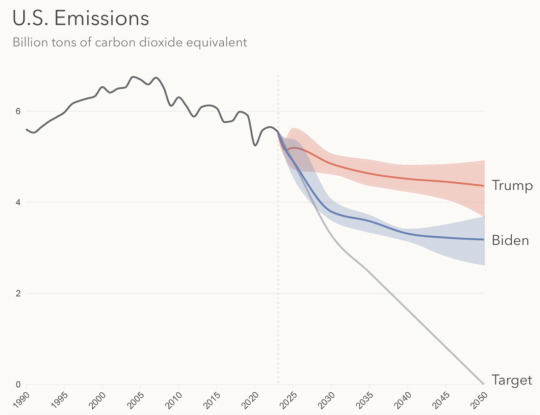
as you can see under Biden we're on goal through 2030, and then more and different policies would be needed to get us where we need to go, which Biden team in the dying days of his administration has set not that Trump will follow through.
so point being helping re-elect Trump might have doomed the planet so idk about anything "good" TikTok could possibly do to make up for being Responsible or the single biggest climate disaster in human history.
any ways, as a Jew when I think of TikTok I think antisemitism
"Jewish teens say life on TikTok comes with anti-Semitism" 2020
"Sliding Through: Spreading Antisemitism on TikTok by Exploiting Moderation Gaps" 2023
"How fast does TikTok send users down the antisemitic rabbit hole?" 2024
being on the internet right now as a Jewish person is fucking wild, buck wild, seeing people in their teens and 20s say NAZI, old school, 1940s Nazi shit on-line, in videos with their faces, it is everywhere and TikTok is some of the worst of it.
on top of which TikTok is spoon feeding massive amount of disinformation to users all the time, from mental health, to Covid Vaccines, to conspiracy theories that are effecting the real world. And studies show its actively hurting teens, pushing them toward self harm
speaking of Australia, its very clear that China is REALLY interested in influencing your country seeking to shift Australian public opinion against Taiwan and in favor of China, as well as push the country toward a more isolationist view. Also they're using data from not just TikTok but other apps to track people, and actively kidnap Chinese nationals in Australia who offend Xi's government. That's a wider problem than just TikTok of course, but it's super fucking scary.
So sorry the app you like is getting the axe in the US? I guess? but short form video in and of itself might be bad for your health. Apps like TikTok don't allow you to do what I've done here, offer links and data to back up what I'm saying so fact checking and accountability is basically 0. Finally there's a lot of evidence that TikTok has put its finger on the scale to push propaganda for Trump, for Xi and generally destabilize the world.
finally, what community? watching videos fed to you by a computer isn't a connection, its certainly not a conversation.
oh also "there is no ethical consumption under capitalism" is not some magical spell, it doesn't do away with the need to do good in the world, its meant to say don't let perfect be the enemy of good, whats the least bad option, nothing is flawless, but that doesn't mean going on to the app who's parting message to America was "big good daddy Trump gonna come save us" like fuck man thats bad
#politics#political#US politics#australian politics#TikTok#TikTok ban#China#Trump#xi jinping#ask#answer
82 notes
·
View notes
Text
Etiquette of the Edwardian Era and La Belle Époque: Tea
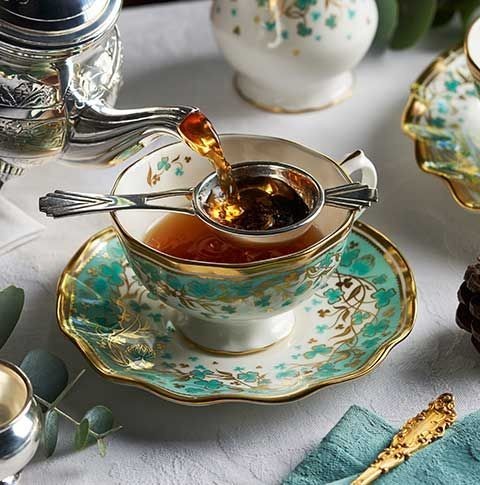
This is a new set of posts focusing on the period of time stretching from the late 19th century to the early 20th Century right up to the start of WWI. I'll be going through different aspects of life. This series can be linked to my Great House series as well as my Season post and Debutant post.
Today will be focusing on the rules of tea with this time period.
Tea was a staple in society, not only as a comforting beverage but as a social gathering beset by strict rules. Etiquette at tea is not only important for guests but is a sign of respect to one's host.
High Tea vs Afternoon Tea
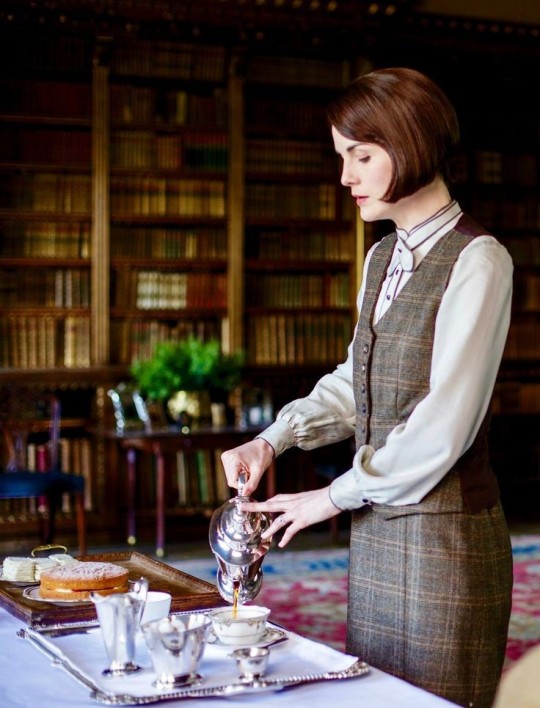
You're reading both terms and you're thinking high tea is the formal version and afternoon is informal. In fact, no. It is the opposite. High tea was actually served far later, about 6pm/7pm and focused on more savoury, substantial dishes. High tea was more of a lower class tradition, designed to fill the stomachs of hungry workers. The word "high" is derived from the tall tables used. Afternoon tea is served at 4pm, designed to fill the gap between lunch and dinner. Afternoon tea is served at low tables with all the guests seated and involve a lighter meal, more nibbles than anything.
Hosting and Attending Tea
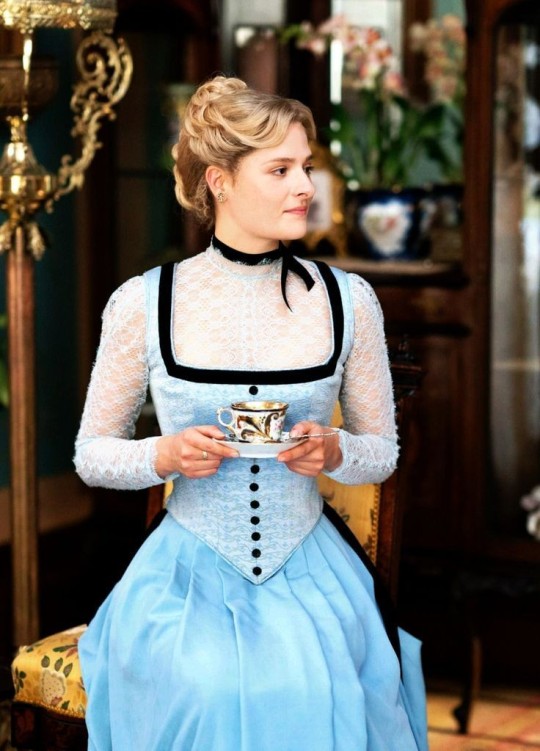
Tea is an event that happens every day, it's not an excuse for a snack, it's a ritual. One can have tea served in one's own home or at the home of a friend. One must be invited to tea, one can't just show up and expect to get fed. Tea was typically served in libraries or drawing rooms and done times outside in the gardens if weather permits. One had to dress for tea usually in comfortable but appropriate clothing. Men would wear suits, women would wear tea gowns or a simple gown - keeping their hats upon their head, if they are visiting. Tea was not poured by the footman but by the host or if it is a large party, by one assigned guest. The hostess or designated tea pourer would serve themselves last.
The Tea Set
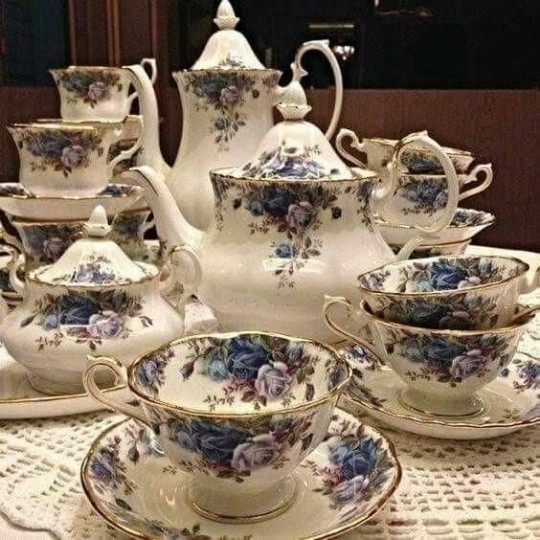
Tea sets are highly coveted and much remarked upon at tea. One would usually inherit a service (that's what the collection was called) or be gifted it at one's wedding. Services would all match and most households had different kinds, the best usually reserved for important guests.
Teapot: the tea pot held the hot water and tea leaves was was usually made of china and decorated.
Cups: the cups were generally low, shallow.
Saucer: a small plate for the cup to rest on
Tea cannister: where dried tea leaves would rest until needed.
Sugar bowl: was a small container made of china with a cover to protect the sugar from moisture.
Milk jug: a container for the milk
Slop basin: was a porcelain dish used for disposing tea leaves left behind with the dregs of tea.
Tea spoon: small spoon used to stir tea
Side Plate: small serving plate used for food.
As you might have noticed, other than a tea spoon, cutlery is not listed. There would be a spoon for jam and a knife for a scone, most food was designed to be eaten with one's hands.
There is also one instrument not listed here and it's the most recognisable thing at afternoon tea.
The Tiered Tray
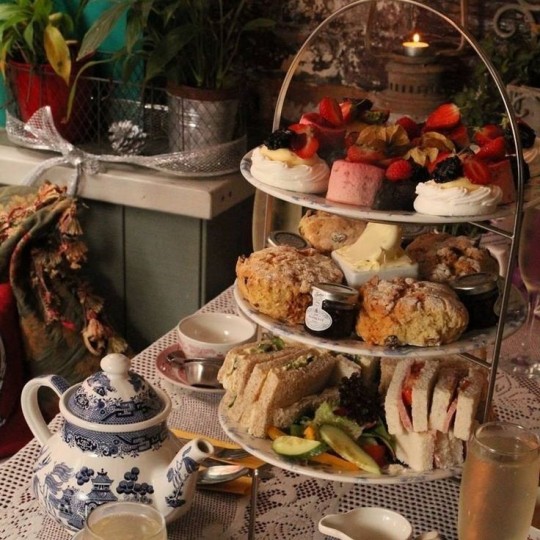
The tiered tray is a set of trays stacked upon one another holding on each one, a different course. Sandwiches and savouries were served on the bottom (Favourites include smoked salmon, cucumber, cress, egg salad sandwiches), scones on the second and sweeter delights served on the top (sponge cake, macaroons, pastries etc). One would begin ay the bottom and work one's way upward.
Making the Perfect Cup of Tea in the Edwardian Era/Belle Epoque/Gilded Age
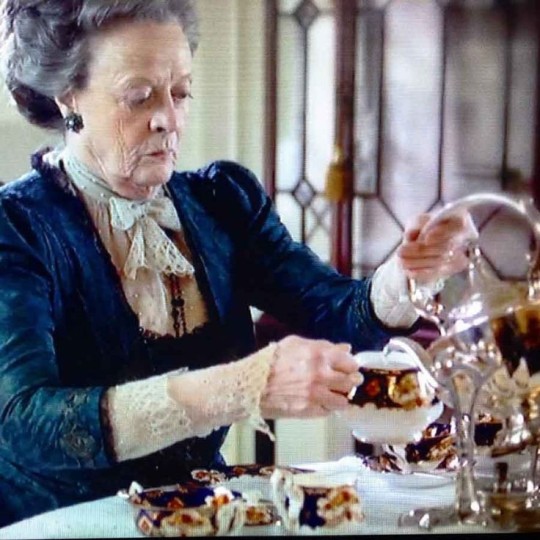
Disclaimers: Let's make one thing clear. Tea is not prepared one way for all. Tea is culturally important across the world and every culture has their own rules about how tea is consumed and served. There's no one right way.
I will be discussing the English way of brewing tea in this post.
As mentioned before, tea is held in a cannister before use. Tea leaves were added to the hot water and lightly stirred.
Controversially for most people, milk was commonly added first.
One would then set a strainer in one's cup, tilting the pot. The strainer will catch the leaves and leave your cup almost tea-pulp free.
With the tea added, one could add in sugar. The trick is not to make a show about it or be too loud. One simply should gently turn your spoon from the 6 o'clock position to the 12 o'clock position. Also, the spoon rests on the saucer when not in use and doesn't stay in your cup.
When drinking your tea, put your pinky down. That's an American myth. Simply lift your cup to you, lifting the cup to your mouth by the handle. Saucers are not lifted unless your cup is far away. Don't slurp it, there's plenty more where that came from.
Etiquette at Tea
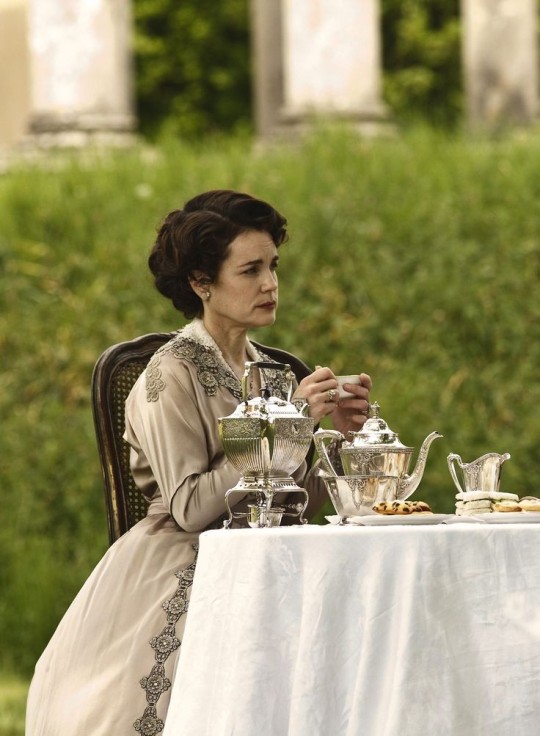
Afternoon tea is for light conversation, do avoid heavy topics.
Listen attentively when being spoken to.
Don't talk with your mouth full or stuff your mouth. Typically everything should be polished off with 2-3 bites.
Gloves should be removed at tea because one is eating with their fingers.
If one is leaving the table to go to the bathroom or a breath of air, simply turn to your neighbours and excuse yourself. No explanation needed.
Napkins should be removed from the table and set across one's lap when one is sitting down. When finished with tea, set it beside your plate before you rise.
Also you daub, not smear.
Don't cut your scone but break it.
Don't lick your fingers.
Don't bang the spoon on the side of the cup.
Also there's no dunking biscuits into your tea. It's just not done at afternoon tea.
Never thank the staff for fetching anything - or at very least, don't be overhead doing so.
Always say your goodbyes to the hostess and compliment the tea, even if you had a rubbish time.
Also most importantly, never criticise somebody else's manners. That's the height of rudeness.
#Etiquette of the Edwardian Era and La Belle Epoque#Tea#Afternoon tea#High tea#Tea party#Edwardian Era#Gilded age#Belle Epoque#writing resources#writing reference#writing advice#ask answered questions#writing advice writing resources#writers#writeblr#writing#writing research#Writing resources writing reference#Writing reference writing advice#Writing advice writing reference#Fantasy guide
919 notes
·
View notes
Text
The Global Right Ascendance Will Leave Israel in the Wreckage
Many people have taken note of recent poll data regarding American attitudes towards Israel, which are (to summarize) cratering. Among Democrats, 69% now view Israel unfavorably. This doesn't surprise me, as Israel has done everything it possibly can to spit in the eye of Democrats and liberals (and yet somehow seems ever-so wounded that it's resulted in declining support). To paraphrase Chidi from The Good Place: In order to be a liberal, you have to do liberal things! But what really should get people's eyebrows up are the numbers amongst young Republicans, where a majority (50%) also view Israel unfavorably (this is in contrast to older Republicans, who overwhelmingly like Israel; amongst Democrats there is a little generational gap). The MAGA Young Turks have no reservoir of good will towards Israel. They may sometimes find it a useful rhetorical trope to instantiate other goals (like xenophobic nativism), but it's a purely instrumental play. Ultimately, the rising tide of antisemitism amongst young Republicans is going to swamp whatever residual utility Israel has in the toolkit of right-wing domestic authoritarianism. Indeed, reading this poll data reminded me of Robert Kagan's article a few years ago about Israel's future in an illiberal world -- namely, that Israel is delusional if it thinks that, in a world governed by reactionary nationalism combined with short-sighted faux-realpolitik, it will retain any sort of "special relationship" with its erstwhile patrons. Negative polarization alone will accelerate already deteriorating relationship Israel has with other western powers as Israel becomes associated with the new illiberal bloc; but if you look at the prime players in said bloc (Russia, China), Israel's never had an especially warm relationship with them either. Add that to the waxing influence amongst young MAGA sorts of figures like Tucker Carlson and Candace Owens, and why would Israel expect to remain anyone's favorite? Why wouldn't the right jettison Israel the moment it becomes an inconvenience to dealmaking with nations possessing more people, more territory, more wealth, and more oil? We're already seeing inklings of this in how Israel has been treated in the tariff, er, "negotiations." First, they were slapped with higher tariffs than Iran. Israel tried to preempt that move by dropping its tariff rate for the United States to zero, but it didn't work even after an embarrassing bit of personal supplication from Bibi. Turns out Israel isn't Trump's special favorite; the best it can hope for is to be relegated to a pure client-state, begging for scraps (even antisemites, after all, sometimes are willing to tolerate Jews when they sit in states of permanent abasement). This is all, of course, leopards-eating-faces on a geopolitical scale. But Israeli conservatives are, I think, in complete denial as to what's happening here. There may or may not be an ascendance of illiberal conservatism over the next few decades. But I predict that, of all the countries that might identify with and try to hop aboard that bandwagon, Israel is the most likely to be left behind in the wreckage. via The Debate Link https://ift.tt/A2ISyJY
39 notes
·
View notes
Note
Not quite sure if sent the message cause bad internet connection so i'll just paste the whole thing here again incase:
Hey peargor!(donno if you're still using tumblr bt whatever) Let me Congrats ya for your coming completion on Touhou project first (yay恭喜)
Here's the wandering dude from mainland china(typical netizen lol)and randomly clicked into ya website while visiting webrings & link collections.Lotta ideas jump through my head and letme say a few words below: BoTWR's really a good series from my perspective,like,Dispite having gaps when understanding the lore,i still can kinda understand the characters,from core to spirit(Cantonese's partly cognizable for mandarin viewers so it kinda fun when lookin' zoey swearing lol)I guess a variety of mainland audience would like it too.Like,it even inspired me to have a look back into the history and mess 'n hongkong on the "great firewall" and made me sorta think deeply about all these mess……but anyways,here's imaginary non medal stickers:
"Mandarin approved"and
"i concerned for la nation"(just kidding),
and i'll keep focusing on the series(actually the others' quite adorable too,sure it took me a while to realize that you actually deeply involve in internet meme culture,after the shock when i found you do made the pogchamp meme gosh)
Btw Just wondering,did the reading disorder cause you to use more english in written form stuff?
Looking forward for the upcoming new chapters yet a few more words:
1:LIT ' O TOMMIE DESERVES BETTER Yo
Poor tommy,hope he 'll get a chance to be a man
2:mmm how and what would zoey's dad be…… He's sorta a villain for now but i hope he's just a dude who failed to correct his own fault by force or "internal error"?
3:that color can be some exposure of one's emotion thing.yeah classic "into head" thingy but perhaps it means more deep than what it seems?Maybe Blue represents the sadness,niche thoughts,hopeless rational thinking,Yellow's cheerfully craziness,Red's cruelly dialectical greedin' justice,and BLACK's something unresist-able unless you learn some real floyd's philosophy thing?
You can get some new referencing idea from the old HK's TVB show like "大时代"(The Greed of a man),also some new from mainland that accidentally have more coverage report on hk which apple dailys' doesn't(?),Trust me,gotta be good for setting both character and lore
Whatever,Best wishes on not getting perished by cops!(pretty sure you won't be cause you probably haven't spoke something politically for at least 2 years on the public internet and you won't be caught for drawing "china virus girl?" and political comments too early haha)
PS:Try to get yourself a fan-base besides the old social meida the X,patron,like a mewe,discord group somethin' alike for a better place for talks 'n discussion i suppose?
Hi fellow netizen! I'm sure the mainland would like to read the comics but that really opens up a can of worms that I'm not prepared to deal with yet, so for now I'll refrain from translating the comics.
1: Tommy has the happiest life compared to the rest of the main cast I wouldn't worry too much about him lol
2: mm it's much more complicated, I also think my audience expects a political opinion from me. It ties to my own experiences with asian culture in general. I am very critical, but I think the public expectation to what I'm critical of is kinda skewed at the moment. There's so much nuance to this story I hope people have a healthy discussion over the conclusion of Zoey's arc in the future.
3: Yellow, Blue and Red are the key colours. What they represent is up to your own interpretation. To me yellow is the self/your values, blue is career/ambition, and red is religion/community/family. There's more colours down the road but these are the most important ones. If there's going to be discussions over the story please feel free to create those spaces! I haven't done so because I am the main writer and I would like these things to happen naturally in the future. It feels wrong for me to create a space as someone with complete authority over the story.
Thanks for sharing your thoughts on IWBTWR! Sorry it took so long to respond, I've been trying to find the words to convery my thoughts properly.
42 notes
·
View notes
Text
A long trip on an American highway in the summer of 2024 leaves the impression that two kinds of billboards now have near-monopoly rule over our roads. On one side, the billboards, gravely black-and-white and soberly reassuring, advertise cancer centers. (“We treat every type of cancer, including the most important one: yours”; “Beat 3 Brain Tumors. At 57, I gave birth, again.”) On the other side, brightly colored and deliberately clownish billboards advertise malpractice and personal-injury lawyers, with phone numbers emblazoned in giant type and the lawyers wearing superhero costumes or intimidating glares, staring down at the highway as they promise to do to juries.
A new Tocqueville considering the landscape would be certain that all Americans do is get sick and sue each other. We ask doctors to cure us of incurable illnesses, and we ask lawyers to take on the doctors who haven’t. We are frightened and we are angry; we look to expert intervention for the fears, and to comic but effective-seeming figures for retaliation against the experts who disappoint us.
Much of this is distinctly American—the idea that cancer-treatment centers would be in competitive relationships with one another, and so need to advertise, would be as unimaginable in any other industrialized country as the idea that the best way to adjudicate responsibility for a car accident is through aggressive lawsuits. Both reflect national beliefs: in competition, however unreal, and in the assignment of blame, however misplaced. We want to think that, if we haven’t fully enjoyed our birthright of plenty and prosperity, a nameable villain is at fault.
To grasp what is at stake in this strangest of political seasons, it helps to define the space in which the contest is taking place. We may be standing on the edge of an abyss, and yet nothing is wrong, in the expected way of countries on the brink of apocalypse. The country is not convulsed with riots, hyperinflation, or mass immiseration. What we have is a sort of phony war—a drôle de guerre, a sitzkrieg—with the vehemence of conflict mainly confined to what we might call the cultural space.
These days, everybody talks about spaces: the “gastronomic space,” the “podcast space,” even, on N.F.L. podcasts, the “analytic space.” Derived from some combination of sociology and interior design, the word has elbowed aside terms like “field” or “conversation,” perhaps because it’s even more expansive. The “space” of a national election is, for that reason, never self-evident; we’ve always searched for clues.
And so William Dean Howells began his 1860 campaign biography of Abraham Lincoln by mocking the search for a Revolutionary pedigree for Presidential candidates and situating Lincoln in the antislavery West, in contrast to the resigned and too-knowing East. North vs. South may have defined the frame of the approaching war, but Howells was prescient in identifying East vs. West as another critical electoral space. This opposition would prove crucial—first, to the war, with the triumph of the Westerner Ulysses S. Grant over the well-bred Eastern generals, and then to the rejuvenation of the Democratic Party, drawing on free-silver populism and an appeal to the values of the resource-extracting, expansionist West above those of the industrialized, centralized East.
A century later, the press thought that the big issues in the race between Richard Nixon and John F. Kennedy were Quemoy and Matsu (two tiny Taiwan Strait islands, claimed by both China and Taiwan), the downed U-2, the missile gap, and other much debated Cold War obsessions. But Norman Mailer, in what may be the best thing he ever wrote, saw the space as marked by the rise of movie-star politics—the image-based contests that, from J.F.K. to Ronald Reagan, would dominate American life. In “Superman Comes to the Supermarket,” published in Esquire, Mailer revealed that a campaign that looked at first glance like the usual black-and-white wire-service photography of the first half of the twentieth century was really the beginning of our Day-Glo-colored Pop-art turn.
And our own electoral space? We hear about the overlooked vs. the élite, the rural vs. the urban, the coastal vs. the flyover, the aged vs. the young—about the dispossessed vs. the beneficiaries of global neoliberalism. Upon closer examination, however, these binaries blur. Support for populist nativism doesn’t track neatly with economic disadvantage. Some of Donald Trump’s keenest supporters have boats as well as cars and are typically the wealthier citizens of poorer rural areas. His stock among billionaires remains high, and his surprising support among Gen Z males is something his campaign exploits with visits to podcasts that no non-Zoomer has ever heard of.
But polarized nations don’t actually polarize around fixed poles. Civil confrontations invariably cross classes and castes, bringing together people from radically different social cohorts while separating seemingly natural allies. The English Revolution of the seventeenth century, like the French one of the eighteenth, did not array worn-out aristocrats against an ascendant bourgeoisie or fierce-eyed sansculottes. There were, one might say, good people on both sides. Or, rather, there were individual aristocrats, merchants, and laborers choosing different sides in these prerevolutionary moments. No civil war takes place between classes; coalitions of many kinds square off against one another.
In part, that’s because there’s no straightforward way of defining our “interests.” It’s in the interest of Silicon Valley entrepreneurs to have big tax cuts; in the longer term, it’s also in their interest to have honest rule-of-law government that isn’t in thrall to guilds or patrons—to be able to float new ideas without paying baksheesh to politicians or having to worry about falling out of sixth-floor windows. “Interests” fail as an explanatory principle.
Does talk of values and ideas get us closer? A central story of American public life during the past three or four decades is (as this writer has noted) that liberals have wanted political victories while reliably securing only cultural victories, even as conservatives, wanting cultural victories, get only political ones. Right-wing Presidents and legislatures are elected, even as one barrier after another has fallen on the traditionalist front of manners and mores. Consider the widespread acceptance of same-sex marriage. A social transformation once so seemingly untenable that even Barack Obama said he was against it, in his first campaign for President, became an uncontroversial rite within scarcely more than a decade.
Right-wing political power has, over the past half century, turned out to have almost no ability to stave off progressive social change: Nixon took the White House in a landslide while Norman Lear took the airwaves in a ratings sweep. And so a kind of permanent paralysis has set in. The right has kept electing politicians who’ve said, “Enough! No more ‘Anything goes’!”—and anything has kept going. No matter how many right-wing politicians came to power, no matter how many right-wing judges were appointed, conservatives decided that the entire culture was rigged against them.
On the left, the failure of cultural power to produce political change tends to lead to a doubling down on the cultural side, so that wholesome college campuses can seem the last redoubt of Red Guard attitudes, though not, to be sure, of Red Guard authority. On the right, the failure of political power to produce cultural change tends to lead to a doubling down on the political side in a way that turns politics into cultural theatre. Having lost the actual stages, conservatives yearn to enact a show in which their adversaries are rendered humiliated and powerless, just as they have felt humiliated and powerless. When an intolerable contradiction is allowed to exist for long enough, it produces a Trump.
As much as television was the essential medium of a dozen bygone Presidential campaigns (not to mention the medium that made Trump a star), the podcast has become the essential medium of this one. For people under forty, the form—typically long-winded and shapeless—is as tangibly present as Walter Cronkite’s tightly scripted half-hour news show was fifty years ago, though the D.I.Y. nature of most podcasts, and the premium on host-read advertisements, makes for abrupt tonal changes as startling as those of the highway billboards.
On the enormously popular, liberal-minded “Pod Save America,” for instance, the hosts make no secret of their belief that the election is a test, as severe as any since the Civil War, of whether a government so conceived can long endure. Then they switch cheerfully to reading ads for Tommy John underwear (“with the supportive pouch”), for herbal hangover remedies, and for an app that promises to cancel all your excess streaming subscriptions, a peculiarly niche obsession (“I accidentally paid for Showtime twice!” “That’s bad!”). George Conway, the former Republican (and White House husband) turned leading anti-Trumper, states bleakly on his podcast for the Bulwark, the news-and-opinion site, that Trump’s whole purpose is to avoid imprisonment, a motivation that would disgrace the leader of any Third World country. Then he immediately leaps into offering—like an old-fashioned a.m.-radio host pushing Chock Full o’Nuts—testimonials for HexClad cookware, with charming self-deprecation about his own kitchen skills. How serious can the crisis be if cookware and boxers cohabit so cozily with the apocalypse?
And then there’s the galvanic space of social media. In the nineteen-seventies and eighties, we were told, by everyone from Jean Baudrillard to Daniel Boorstin, that television had reduced us to numbed observers of events no longer within our control. We had become spectators instead of citizens. In contrast, the arena of social media is that of action and engagement—and not merely engagement but enragement, with algorithms acting out addictively on tiny tablets. The aura of the Internet age is energized, passionate, and, above all, angry. The algorithms dictate regular mortar rounds of text messages that seem to come not from an eager politician but from an infuriated lover, in the manner of Glenn Close in “Fatal Attraction”: “Are you ignoring us?” “We’ve reached out to you PERSONALLY!” “This is the sixth time we’ve asked you!” At one level, we know they’re entirely impersonal, while, at another, we know that politicians wouldn’t do this unless it worked, and it works because, at still another level, we are incapable of knowing what we know; it doesn’t feel entirely impersonal. You can doomscroll your way to your doom. The democratic theorists of old longed for an activated citizenry; somehow they failed to recognize how easily citizens could be activated to oppose deliberative democracy.
If the cultural advantages of liberalism have given it a more pointed politics in places where politics lacks worldly consequences, its real-world politics can seem curiously blunted. Kamala Harris, like Joe Biden before her, is an utterly normal workaday politician of the kind we used to find in any functioning democracy—bending right, bending left, placating here and postponing confrontation there, glaring here and, yes, laughing there. Demographics aside, there is nothing exceptional about Harris, which is her virtue. Yet we live in exceptional times, and liberal proceduralists and institutionalists are so committed to procedures and institutions—to laws and their reasonable interpretation, to norms and their continuation—that they can be slow to grasp that the world around them has changed.
One can only imagine the fulminations that would have ensued in 2020 had the anti-democratic injustice of the Electoral College—which effectively amplifies the political power of rural areas at the expense of the country’s richest and most productive areas—tilted in the other direction. Indeed, before the 2000 election, when it appeared as if it might, Karl Rove and the George W. Bush campaign had a plan in place to challenge the results with a “grassroots” movement designed to short-circuit the Electoral College and make the popular-vote winner prevail. No Democrat even suggests such a thing now.
It’s almost as painful to see the impunity with which Supreme Court Justices have torched their institution’s legitimacy. One Justice has the upside-down flag of the insurrectionists flying on his property; another, married to a professional election denialist, enjoys undeclared largesse from a plutocrat. There is, apparently, little to be done, nor even any familiar language of protest to draw on. Prepared by experience to believe in institutions, mainstream liberals believe in their belief even as the institutions are degraded in front of their eyes.
In one respect, the space of politics in 2024 is transoceanic. The forms of Trumpism are mirrored in other countries. In the U.K., a similar wave engendered the catastrophe of Brexit; in France, it has brought an equally extreme right-wing party to the brink, though not to the seat, of power; in Italy, it elevated Matteo Salvini to national prominence and made Giorgia Meloni Prime Minister. In Sweden, an extreme-right group is claiming voters in numbers no one would ever have thought possible, while Canadian conservatives have taken a sharp turn toward the far right.
What all these currents have in common is an obsessive fear of immigration. Fear of the other still seems to be the primary mover of collective emotion. Even when it is utterly self-destructive—as in Britain, where the xenophobia of Brexit cut the U.K. off from traditional allies while increasing immigration from the Global South—the apprehension that “we” are being flooded by frightening foreigners works its malign magic.
It’s an old but persistent delusion that far-right nationalism is not rooted in the emotional needs of far-right nationalists but arises, instead, from the injustices of neoliberalism. And so many on the left insist that all those Trump voters are really Bernie Sanders voters who just haven’t had their consciousness raised yet. In fact, a similar constellation of populist figures has emerged, sharing platforms, plans, and ideologies, in countries where neoliberalism made little impact, and where a strong system of social welfare remains in place. If a broadened welfare state—national health insurance, stronger unions, higher minimum wages, and the rest—would cure the plague in the U.S., one would expect that countries with resilient welfare states would be immune from it. They are not.
Though Trump can be situated in a transoceanic space of populism, he isn’t a mere symptom of global trends: he is a singularly dangerous character, and the product of a specific cultural milieu. To be sure, much of New York has always been hostile to him, and eager to disown him; in a 1984 profile of him in GQ, Graydon Carter made the point that Trump was the only New Yorker who ever referred to Sixth Avenue as the “Avenue of the Americas.” Yet we’re part of Trump’s identity, as was made clear by his recent rally on Long Island—pointless as a matter of swing-state campaigning, but central to his self-definition. His belligerence could come directly from the two New York tabloid heroes of his formative years in the city: John Gotti, the gangster who led the Gambino crime family, and George Steinbrenner, the owner of the Yankees. When Trump came of age, Gotti was all over the front page of the tabloids, as “the Teflon Don,” and Steinbrenner was all over the back sports pages, as “the Boss.”
Steinbrenner was legendary for his middle-of-the-night phone calls, for his temper and combativeness. Like Trump, who theatricalized the activity, he had a reputation for ruthlessly firing people. (Gotti had his own way of doing that.) Steinbrenner was famous for having no loyalty to anyone. He mocked the very players he had acquired and created an atmosphere of absolute chaos. It used to be said that Steinbrenner reduced the once proud Yankees baseball culture to that of professional wrestling, and that arena is another Trumpian space. Pro wrestling is all about having contests that aren’t really contested—that are known to be “rigged,” to use a Trumpian word—and yet evoke genuine emotion in their audience.
At the same time, Trump has mastered the gangster’s technique of accusing others of crimes he has committed. The agents listening to the Gotti wiretap were mystified when he claimed innocence of the just-committed murder of Big Paul Castellano, conjecturing, in apparent seclusion with his soldiers, about who else might have done it: “Whoever killed this cocksucker, probably the cops killed this Paul.” Denying having someone whacked even in the presence of those who were with you when you whacked him was a capo’s signature move.
Marrying the American paranoid style to the more recent cult of the image, Trump can draw on the manner of the tabloid star and show that his is a game, a show, not to be taken quite seriously while still being serious in actually inciting violent insurrections and planning to expel millions of helpless immigrants. Self-defined as a showman, he can say anything and simultaneously drain it of content, just as Gotti, knowing that he had killed Castellano, thought it credible to deny it—not within his conscience, which did not exist, but within an imaginary courtroom. Trump evidently learned that, in the realm of national politics, you could push the boundaries of publicity and tabloid invective far further than they had ever been pushed.
Trump’s ability to be both joking and severe at the same time is what gives him his power and his immunity. This power extends even to something as unprecedented as the assault on the U.S. Capitol. Trump demanded violence (“If you don’t fight like hell, you’re not going to have a country anymore”) but stuck in three words, “peacefully and patriotically,” that, however hollow, were meant to immunize him, Gotti-style. They were, so to speak, meant for the cops on the wiretap. Trump’s resilience is not, as we would like to tell our children about resilience, a function of his character. It’s a function of his not having one.
Just as Trump’s support cuts across the usual divisions, so, too, does a divide among his opponents—between the maximizers, who think that Trump is a unique threat to liberal democracy, and the minimizers, who think that he is merely the kind of clown a democracy is bound to throw up from time to time. The minimizers (who can be found among both Marxist Jacobin contributors and Never Trump National Review conservatives) will say that Trump has crossed the wires of culture and politics in a way that opportunistically responds to the previous paralysis, but that this merely places him in an American tradition. Democracy depends on the idea that the socially unacceptable might become acceptable. Andrew Jackson campaigned on similar themes with a similar manner—and was every bit as ignorant and every bit as unaware as Trump. (And his campaigns of slaughter against Indigenous people really were genocidal.) Trump’s politics may be ugly, foolish, and vain, but ours is often an ugly, undereducated, and vain country. Democracy is meant to be a mirror; it shows what it shows.
Indeed, America’s recent history has shown that politics is a trailing indicator of cultural change, and that one generation’s most vulgar entertainment becomes the next generation’s accepted style of political argument. David S. Reynolds, in his biography of Lincoln, reflects on how the new urban love of weird spectacle in the mid-nineteenth century was something Lincoln welcomed. P. T. Barnum’s genius lay in taking circus grotesques and making them exemplary Americans: the tiny General Tom Thumb was a hero, not a freak. Lincoln saw that it cost him nothing to be an American spectacle in a climate of sensation; he even hosted a reception at the White House for Tom Thumb and his wife—as much a violation of the decorum of the Founding Fathers as Trump’s investment in Hulk Hogan at the Republican Convention. Lincoln understood the Barnum side of American life, just as Trump understands its W.W.E. side.
And so, the minimizers say, taking Trump seriously as a threat to democracy in America is like taking Roman Reigns seriously as a threat to fair play in sports. Trump is an entertainer. The only thing he really wants are ratings. When opposing abortion was necessary to his electoral coalition, he opposed it—but then, when that was creating ratings trouble in other households, he sent signals that he wasn’t exactly opposed to it. When Project 2025, which he vaguely set in motion and claims never to have read, threatened his ratings, he repudiated it. The one continuity is his thirst for popularity, which is, in a sense, our own. He rows furiously away from any threatening waterfall back to the center of the river—including on Obamacare. And, the minimizers say, in the end, he did leave the White House peacefully, if gracelessly.
In any case, the panic is hardly unique to Trump. Reagan, too, was vilified and feared in his day, seen as the reductio ad absurdum of the culture of the image, an automaton projecting his controllers’ authoritarian impulses. Nixon was the subject of a savage satire by Philip Roth that ended with him running against the Devil for the Presidency of Hell. The minimizers tell us that liberals overreact in real time, write revisionist history when it’s over, and never see the difference between their stories.
The maximizers regard the minimizers’ case as wishful thinking buoyed up by surreptitious resentments, a refusal to concede anything to those we hate even if it means accepting someone we despise. Maximizers who call Trump a fascist are dismissed by the minimizers as either engaging in name-calling or forcing a facile parallel. Yet the parallel isn’t meant to be historically absolute; it is meant to be, as it were, oncologically acute. A freckle is not the same as a melanoma; nor is a Stage I melanoma the same as the Stage IV kind. But a skilled reader of lesions can sense which is which and predict the potential course if untreated. Trumpism is a cancerous phenomenon. Treated with surgery once, it now threatens to come back in a more aggressive form, subject neither to the radiation of “guardrails” nor to the chemo of “constraints.” It may well rage out of control and kill its host.
And so the maximalist case is made up not of alarmist fantasies, then, but of dulled diagnostic fact, duly registered. Think hard about the probable consequences of a second Trump Administration—about the things he has promised to do and can do, the things that the hard-core group of rancidly discontented figures (as usual with authoritarians, more committed than he is to an ideology) who surround him wants him to do and can do. Having lost the popular vote, as he surely will, he will not speak up to reconcile “all Americans.” He will insist that he won the popular vote, and by a landslide. He will pardon and then celebrate the January 6th insurrectionists, and thereby guarantee the existence of a paramilitary organization that’s capable of committing violence on his behalf without fear of consequences. He will, with an obedient Attorney General, begin prosecuting his political opponents; he was largely unsuccessful in his previous attempt only because the heads of two U.S. Attorneys’ offices, who are no longer there, refused to coöperate. When he begins to pressure CNN and ABC, and they, with all the vulnerabilities of large corporations, bend to his will, telling themselves that his is now the will of the people, what will we do to fend off the slow degradation of open debate?
Trump will certainly abandon Ukraine to Vladimir Putin and realign this country with dictatorships and against NATO and the democratic alliance of Europe. Above all, the spirit of vengeful reprisal is the totality of his beliefs—very much like the fascists of the twentieth century in being a man and a movement without any positive doctrine except revenge against his imagined enemies. And against this: What? Who? The spirit of resistance may prove too frail, and too exhausted, to rise again to the contest. Who can have confidence that a democracy could endure such a figure in absolute control and survive? An oncologist who, in the face of this much evidence, shrugged and proposed watchful waiting as the best therapy would not be an optimist. He would be guilty of gross malpractice. One of those personal-injury lawyers on the billboards would sue him, and win.
What any plausible explanation must confront is the fact that Trump is a distinctively vile human being and a spectacularly malignant political actor. In fables and fiction, in every Disney cartoon and Batman movie, we have no trouble recognizing and understanding the villains. They are embittered, canny, ludicrous in some ways and shrewd in others, their lives governed by envy and resentment, often rooted in the acts of people who’ve slighted them. (“They’ll never laugh at me again!”) They nonetheless have considerable charm and the ability to attract a cult following. This is Ursula, Hades, Scar—to go no further than the Disney canon. Extend it, if that seems too childlike, to the realms of Edmund in “King Lear” and Richard III: smart people, all, almost lovable in their self-recognition of their deviousness, but not people we ever want to see in power, for in power their imaginations become unimaginably deadly. Villains in fables are rarely grounded in any cause larger than their own grievances—they hate Snow White for being beautiful, resent Hercules for being strong and virtuous. Bane is blowing up Gotham because he feels misused, not because he truly has a better city in mind.
Trump is a villain. He would be a cartoon villain, if only this were a cartoon. Every time you try to give him a break—to grasp his charisma, historicize his ascent, sympathize with his admirers—the sinister truth asserts itself and can’t be squashed down. He will tell another lie so preposterous, or malign another shared decency so absolutely, or threaten violence so plausibly, or just engage in behavior so unhinged and hate-filled that you’ll recoil and rebound to your original terror at his return to power. One outrage succeeds another until we become exhausted and have to work hard even to remember the outrages of a few weeks past: the helicopter ride that never happened (but whose storytelling purpose was to demean Kamala Harris as a woman), or the cemetery visit that ended in a grotesque thumbs-up by a graveside (and whose symbolic purpose was to cynically enlist grieving parents on behalf of his contempt). No matter how deranged his behavior is, though, it does not seem to alter his good fortune.
Villainy inheres in individuals. There is certainly a far-right political space alive in the developed world, but none of its inhabitants—not Marine Le Pen or Giorgia Meloni or even Viktor Orbán—are remotely as reckless or as crazy as Trump. Our self-soothing habit of imagining that what has not yet happened cannot happen is the space in which Trump lives, just as comically deranged as he seems and still more dangerous than we know.
Nothing is ever entirely new, and the space between actual events and their disassociated representation is part of modernity. We live in that disassociated space. Generations of cultural critics have warned that we are lost in a labyrinth and cannot tell real things from illusion. Yet the familiar passage from peril to parody now happens almost simultaneously. Events remain piercingly actual and threatening in their effects on real people, while also being duplicated in a fictive system that shows and spoofs them at the same time. One side of the highway is all cancer; the other side all crazy. Their confoundment is our confusion.
It is telling that the most successful entertainments of our age are the dark comic-book movies—the Batman films and the X-Men and the Avengers and the rest of those cinematic universes. This cultural leviathan was launched by the discovery that these ridiculous comic-book figures, generations old, could now land only if treated seriously, with sombre backstories and true stakes. Our heroes tend to dullness; our villains, garishly painted monsters from the id, are the ones who fuel the franchise.
During the debate last month in Philadelphia, as Trump’s madness rose to a peak of raging lunacy—“They’re eating the dogs”; “He hates her!”—ABC, in its commercial breaks, cut to ads for “Joker: Folie à Deux,” the new Joaquin Phoenix movie, in which the crazed villain swirls and grins. It is a Gotham gone mad, and a Gotham, against all the settled rules of fable-making, without a Batman to come to the rescue. Shuttling between the comic-book villain and the grimacing, red-faced, and unhinged man who may be reëlected President in a few weeks, one struggled to distinguish our culture’s most extravagant imagination of derangement from the real thing. The space is that strange, and the stakes that high. ♦
63 notes
·
View notes
Text

BREAKING: Federal Reserve Chair Jerome Powell drops an atom bomb on MAGA world by announcing that Donald Trump's tariffs could endanger employment while simultaneously skyrocketing inflation.
This is an economic doomsday scenario...
"The level of the tariff increases announced so far is significantly larger than anticipated," Powell said at an event hosted by the Economic Club of Chicago. "We may find ourselves in the challenging scenario in which our dual-mandate goals are in tension."
The Fed is tasked with promoting full employment while keeping inflation at a reasonable level but Trump's catastrophic tariffs endanger both mandates.
The tariffs are spiking inflation because the increased costs are passed on to consumers and employment is endangered because companies are choosing to lay off workers to make up for their lost profits.
"A tariff is like a negative supply shock. That’s a stagflationary shock, which is to say it makes both sides of the Fed’s dual mandate worse at the same time," Chicago Fed President Austan Goolsbee said last week.
"Prices are going up while jobs are being lost and growth is coming down, and there is not a generic playbook for how the central bank should respond to a stagflationary shock," he added.
For now, Powell said that the Fed's best plan of action is to wait and see until they get a fuller understanding of the wide-ranging impacts of Trump's tariffs.
He stated that if we hit stagflation — high unemployment and double-digit inflation — then "we would consider how far the economy is from each goal, and the potentially different time horizons over which those respective gaps would be anticipated to close."
"We understand that elevated levels of unemployment or inflation can be damaging and painful for communities, families, and businesses," he added.
While Trump backtracked on his absurdly high so-called "reciprocal" tariffs on most countries, he kept a 10% tariff in place on imports across the board. At the same time, he is ratcheting up a trade war with China, forcing them to impose retaliatory tariffs on American imports.
If Trump puts his "reciprocal" tariffs back in place after the 90-day pause elapses, there is no telling how widespread the economic damage will be.
The worst part about all of this is that Americans gain absolutely nothing from this economic chaos. These tariffs won't bring manufacturing back to the United States because the Trump administration has failed to incentivize such reshoring with subsidies — a crucial piece of any serious reindustrialization strategy.
We are being led off a cliff by the most incompetent president in American history...!
#fuck trump#maga morons#fuck maga#maga cult#traitor trump#republican assholes#republican cheats#trump is an idiot and so are his voters#fuck the gop#inbred
26 notes
·
View notes
Text
Me: Echoing a popular and relatively uncontroversial sentiment about Liu Bei being a virtuous lord to the common people (from what I can tell, having lurked on the Chinese Internet for a long time and growing up Sichuanese)
Random tumblr user: It was all Shu propaganda, the country had no history records, it was all made up by Zhuge Liang, and you are looking at this with first world western morality!
Me, a Shu person on both sides of the family: I could talk about how Chen Shou, the dude who wrote The Records of the Three Kingdoms for the Sima family of the Jin Dynasty, was from Shu and his father and teacher both worked under Liu Bei and Zhuge Liang. How much of what we know about the three kingdoms period and the behaviors of the warlords come from Chen Shou’s book. How the book was based on records from the Wei and Wu Kingdoms, and Chen Shou conducted interviews with old Shu officials and prominent Shu families to fill in the gaps for the lack of surviving Shu records. How he mentions in his book that there used to be Shu records. How the book was written under the political censorship of the Jin Dynasty, which had no incentive to promote a positive view of the Shu. How the book was generally well received by the old families of Wei who had worked under the Cao family. How the Sima family also approved of its contents and included it in their royal library (which helped ensure its survival to this day). But I rather like the idea that Zhuge Liang was so good at propaganda that he brainwashed all the Shu people, who in turn brainwashed all of ancient China to honor Liu Bei as a virtuous lord for the next 1800 years. His ultimate strategic victory for his beloved Zhu Gong ❤️❤️❤️
30 notes
·
View notes
Text
GG and the Duomo di Milano

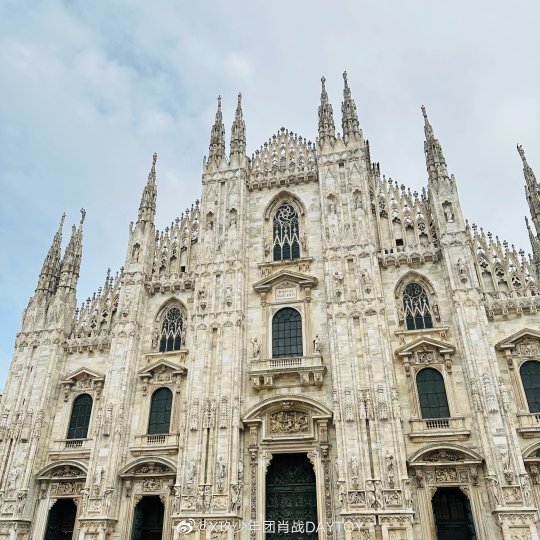
Duomo 2019 (left), 2023 (right) and 2024 (top).
He has posted a photo of it whenever he goes to Milan, since his first trip there in 2019. Here's my CPN on that.
Fake, fan fiction, CPN.
Of course, as an artist and a photographer it makes sense that GG is interested in this beautiful building. Gorgeous intricate architecture that is covered in lifelike statues, no doubt it is very satisfying to photograph. It's truly one of the most stunning cathedrals in the world. But we're turtles, so we're always going to look at things from a slightly different angle.
This CPN first came up back in 2019, the first time he went to Milan. GG said in an interview that he was excited to see the cathedral, and he posted a picture of it on his Weibo account. Turtles at the time speculated that GG was inspired by the photos that were all over the news in 2016, when same sex marriage was legalized there.
It was the location of massive LGBTQ rallies when same sex marriage was being debated and put to a vote, and was the site of equally massive celebrations when that vote won.
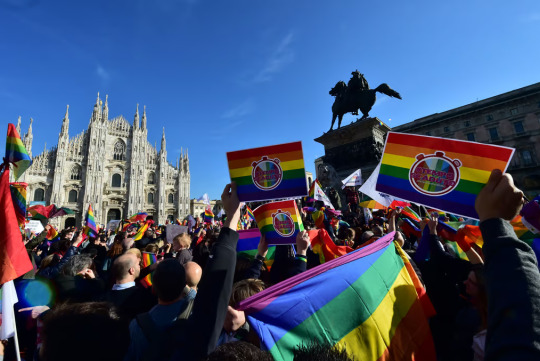
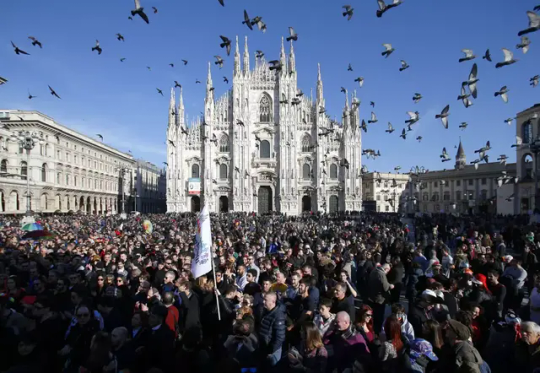
Some people are skeptical of this connection because they feel that the time gap of a couple years is too large for it to be relevant, but to me those people can't possibly understand how significant the same sex marriage fight is to queer people who wish to marry (and who wish to have their human rights recognized in general).
Especially around that time in history, when the fight was at its most active globally. There was a period of a few years where the issue was constantly in the news, as more and more countries were gradually recognizing legal rights for same sex couples. Images of those protests and celebrations were inspiring and exciting for queer people all over the world, and those who cared a lot about the issue followed that news pretty closely.
This is an issue of significance to queer people everywhere, even those who don't want to marry. It represents a shift toward acceptance and toward broader legal recognition of equal human rights for queer people.
Same sex marriage is a huge hurdle toward equality for anyone whose rights are at stake, because most of the opposition to human rights for queer people tends to come from religious groups and conservatives with narrow notions of 'family values'. When societies acknowledge - even on paper - that queer families are legitimate, the biggest barrier has been crossed.
Based on a lot of things I've seen from GG over the years I believe he's very deeply invested in Pride and gay rights. He's not at liberty to be as open about it as he'd like to be, but I believe he shows what he can. I have talked about that in more detail in this post.
I also believe that marriage is something that both GG and DD care a lot about. They are each others anchors in life, and even when they don't get to spend a lot of time together, they are home to each other. DD has also talked about wanting a son, and GG has also shown interest in children and family and often talks about a simple life.
They just ooze domesticity on many levels, and I think that even if it doesn't fit within their lives right now, they probably talk about and think about building a family together one day. And given the culture in China their parents likely want that for them as well.
I talked about the possibility they might already be married in this post. I talked about the possibility of them wanting kids in this post about DD saying he wanted a son, and later in this one from an OOL interview where GG mentioned envying Gu Wei's life.
Both GG and DD strike me as being connected to queer culture, just given some of their jokes, attitudes, etc. and some of the people they're associated with. Even their experience with filming CQL (which I talked about in this post). They're also both from the younger generation in China, which is much more progressive and informed on these issues.
All of this leads me to believe that it's not an accident that this landmark has captured GG's imagination.
The Duomo is also a very popular wedding/romantic photo destination, and where couples often propose.
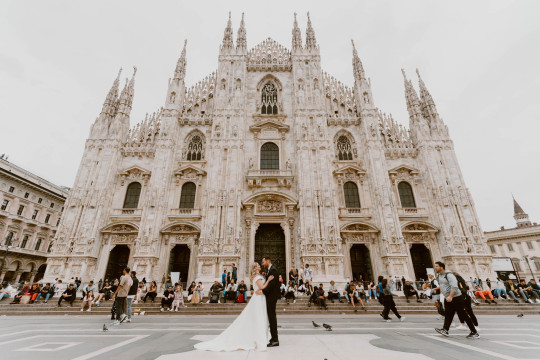
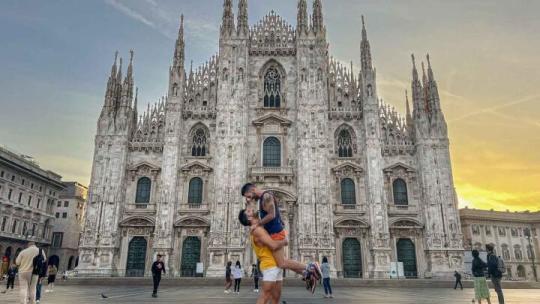
I think that it's romantic that GG posted the moon over the cathedral this time. There are a lot of fake rumors and CPN around GG and DD and the moon, and turtles believe that they often send pictures of the moon to each other. They've both posted photos of the moon on social media in the past.

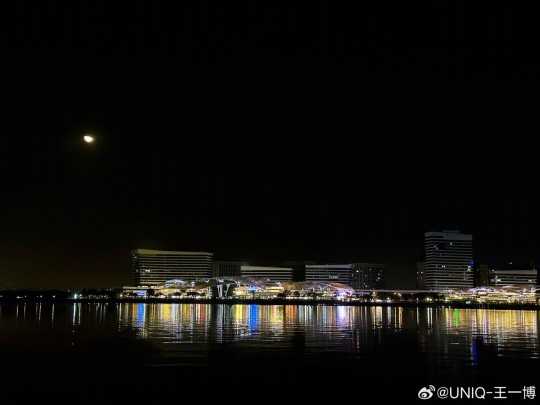


There have been a lot of posts about their connection with the moon over the years. A few of my favorites are Pie's post from Mid-Autumn Festival, Pie's post about Midsummer Moon (among other things) and of course the LRLG rumor that talks about DD taking pictures of the moon for GG.

Given what this landmark might mean to GG, it makes this photo even more special.
Or he could just enjoy photographing a pretty building. We'll likely never know for sure.
130 notes
·
View notes
Note
Hii, hope you're doing well!! I've been meaning to check out more c-dramas. I've never really watched any, but I keep seeing them on my dash and want to start giving some a shot since I watch every other type of drama (BL or otherwise lol). I saw you post often about c-dramas, so I wanted to ask if you had any other recs besides Tender Light (which I'm planning on watching when it's done)? I'm more curious about c-dramas in general rather than any specific genre, since I'm so new to them
Hello, thank you for the ask! I'm glad my obsessive Tender Light posting has got you curious about cdramas. Some of my all time favorite dramas are from Mainland China, and I would be happy to share some recs! Since you are looking for a general sense, I am just going to give you a sampling of some of my personal favs.
Tender Light
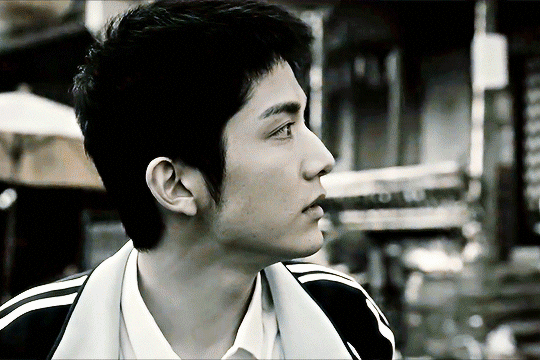
Obviously I will be taking this opportunity to talk up this drama some more, which will be ending its run this weekend. This is, hands down, my favorite drama of the year and easily going on my top 10 dramas of all time list. It's one of the most gorgeous and precise and unflinching pieces of media I have ever seen. This is definitely one for people who love smart mystery writing, dark themes (I mean this for real, if you have a lot of triggers ask for CWs), and explorations of the human condition. It will be staying with me for a long time.
Go Ahead
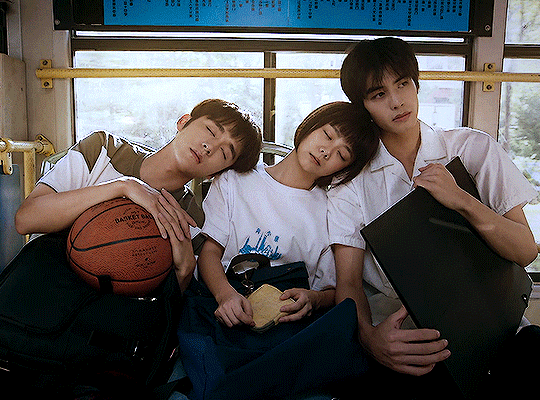
Another of my all time favs (and with cast crossover from Tender Light), this is a family drama that digs deep on the meaning of family, finding your people, and resilience through intergenerational trauma. I love it so so much (I am actually rewatching it right now).
Lighter & Princess
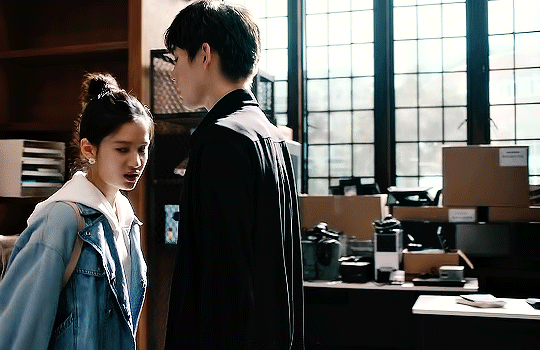
A fantastic romance and owner of a coveted spot on the ride or die drama couples list. In this story you get to watch these two fall in love twice, first in college and then as adults, and both times it's epic.
Reset

How about a time loop thriller? This is one of the best I have ever seen, and its relatively short run keeps it tight and tense all the way through. There's a romance in this one, too, but kissing is definitely secondary to finding their way out of this death trap.
The Rebel Princess
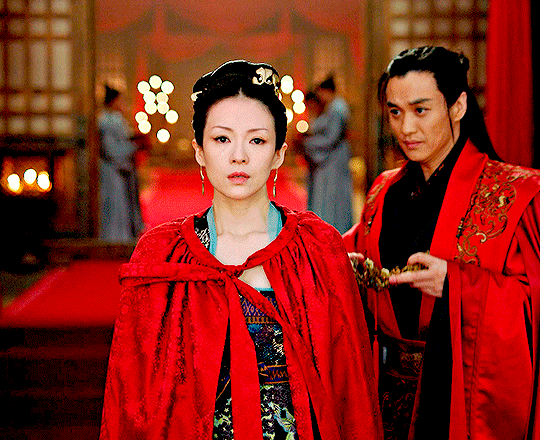
Let's dip our toe into historicals! Granted, I still have plenty of gaps in my historical cdrama watch list (there are just so many and they're so long, I am doing my best people!) but this remains my all time favorite to date. It's epic, it's shockingly well written and paced for its length, the characters are excellent and compelling all around, and it has one of my all time favorite male leads and drama couples (another from the ride or die list!). Don't let the episode number intimidate you, it will fly by much faster than you think.
The Untamed
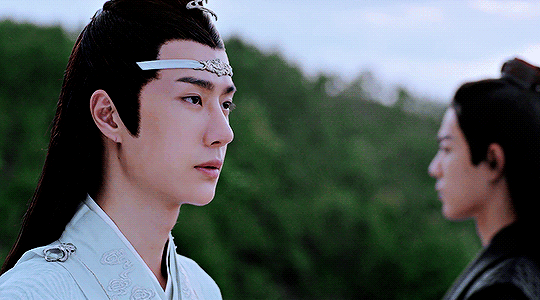
You watch bl so I am assuming you already know about Wei Wuxian and Lan Wangji, but just in case I will also include this drama as a much watch. It's likely the best live action danmei we will ever get.
Love Between Fairy and Devil

Have you ever wondered what it would be like if a show put all your favorite fanfic tropes in a blender, cast beautiful people to act them out, and put them in lavish costumes? Well, here is your answer.
Love and Redemption

This one's for us angst with a happy ending girlies. An epic love story with lots of pining and struggle and strife, and it's so worth it.
Falling Into You
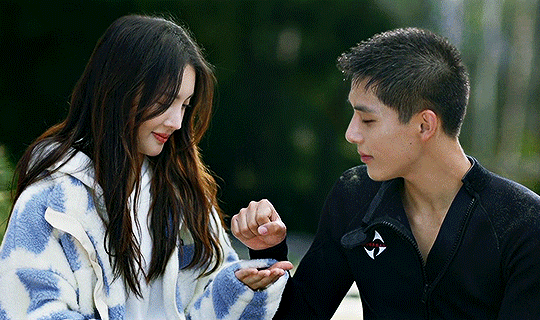
Back to the modern era, this is a classic sports drama with a noona romance. Very unassuming but full of charm and very well executed.
Fake It Till You Make It
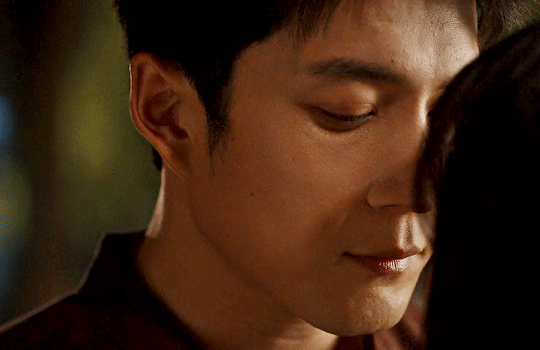
An unusually mature take on adult romance from a cdrama, this one is about two career focused permasingle love skeptics who meet, realize they actually like each other, and try to figure out what the hell to do with that. I love it a lot.
That should be enough to get you started! There are many many more recs to be had, so once you give some of these a try and figure out what you like, feel free to hit me up for more!
#tender light#go ahead#lighter and princess#reset#the rebel princess#the untamed#love between fairy and devil#love and redemption#falling into you#fake it till you make it#cdrama#shan recommends#shan answers
117 notes
·
View notes
Note
wanted to give another perspective on (and why i personally was confused by ppls hostile reaction towards it) socialization but there’s linguistic studies focusing on how pitch is learned. you are not born speaking at the pitch you speak at now you learn from your environment.
what this means is that children, from an extremely early age…likely within months if not weeks or days of birth, begin absorbing social norms about what is an acceptable pitch to speak at. and then when gender becomes a factor they begin to absorb social norms about what is an acceptable pitch to speak at for their assigned gender.
this is across the board in every culture.
it’s also a great way of explaining how male/female socialization is a thing but also not universal. different cultures have different acceptable pitches for people perceived as male or female. and what is an acceptable pitch now may have been different 20 years ago or will be different 20 years from now.
current studies show that american women show a much lower pitch than what was the norm back in the 50s or hell even the 90s. generally speaking americans don’t have a wide gap between pitch ranges for men and women. meanwhile in the uk there’s a noticeable gap.
also, cultures may prefer higher pitched voices regardless of gender or lower pitched voices regardless of gender. in china there are a good handful of languages that have almost not gap between the acceptable range of pitch between male and female speakers. what is considered acceptable across the board is a higher pitch overall (possibly due to many chinese languages being tonal).
basically, putting everything together, male/female socialization may subconsciously (because it’s a learned behavior) impact the pitch someone speaks at but what that pitch is…is entirely dependent on the cultural gender norms thah person lives in.
a bonus from this info is that pitch isn’t gendered (at least not in the way transphobes and weirdos like to think).
(quick note yes testosterone CAN allow your voice to become deeper. but the voice and pitch are very flexible and capable of moving across the range).

Thank you both for sending in! I think these are great examples of how socialization is supposed to be discussed.
48 notes
·
View notes
Text
ok so the us functions on a privatized healthcare model.
one proposed method of funding a nationalized healthcare model is to divert the US’s bloated military budgeting from the DoD towards healthcare
The U.S DoD spending in a year was recently reported as 1.9 trillion dollars. which is a lot of money!
US healthcare spending is estimated to be $4.9 trillion dollars per year, and growing by 7.5% as of 2023. That translates to $14,570 per person, per year.
Even if the entire DoD was dissolved and their entire budget was diverted towards healthcare instead, that would resolve roughly 1/4th of healthcare spending (through taxes), and leave 3 trillion dollars unaccounted for.
Policing budgets, from what I found, didn’t break the 1 trillion threshold. The number I found estimated combined state and local police spending to total around $300 billion.
It’s often argued that privatized healthcare “fills the gap” left open by government spending. For example, thanks to the Affordable Care Act (genuinely one of the most important pieces of legislature in recent history, IMO), a fair number of people on federally subsidized healthcare have a Managed Care plan, where medicaid works with or through a private insurance company to partially fund healthcare.
The disadvantage there being that in a PPO (often privatized insurance?) the client has a lot more freedom to choose your provider, whereas in an MCO or HMO, care is only covered when conducted “in network” (please correct me if i’m wrong, all the different plans are easy to mix up)
Trying to square this circle in my head. Is this our best option? Is there no other way? Indonesia for example has a combined model- JKN is meant to be available to the poorest citizens and support/replace aid-based care centers, and the BPJS provides care more generally. The UK and China (to my understanding) have completely nationalized healthcare systems, which presents its own pros and cons.
If anymore knows more than me about this stuff I’d love to hear it
10 notes
·
View notes